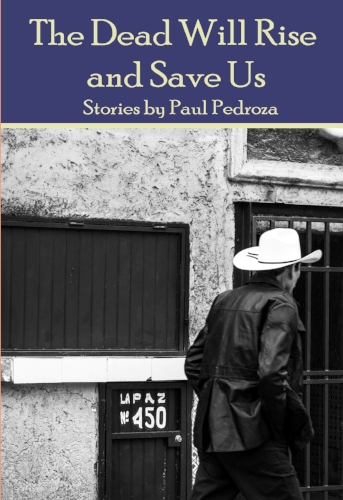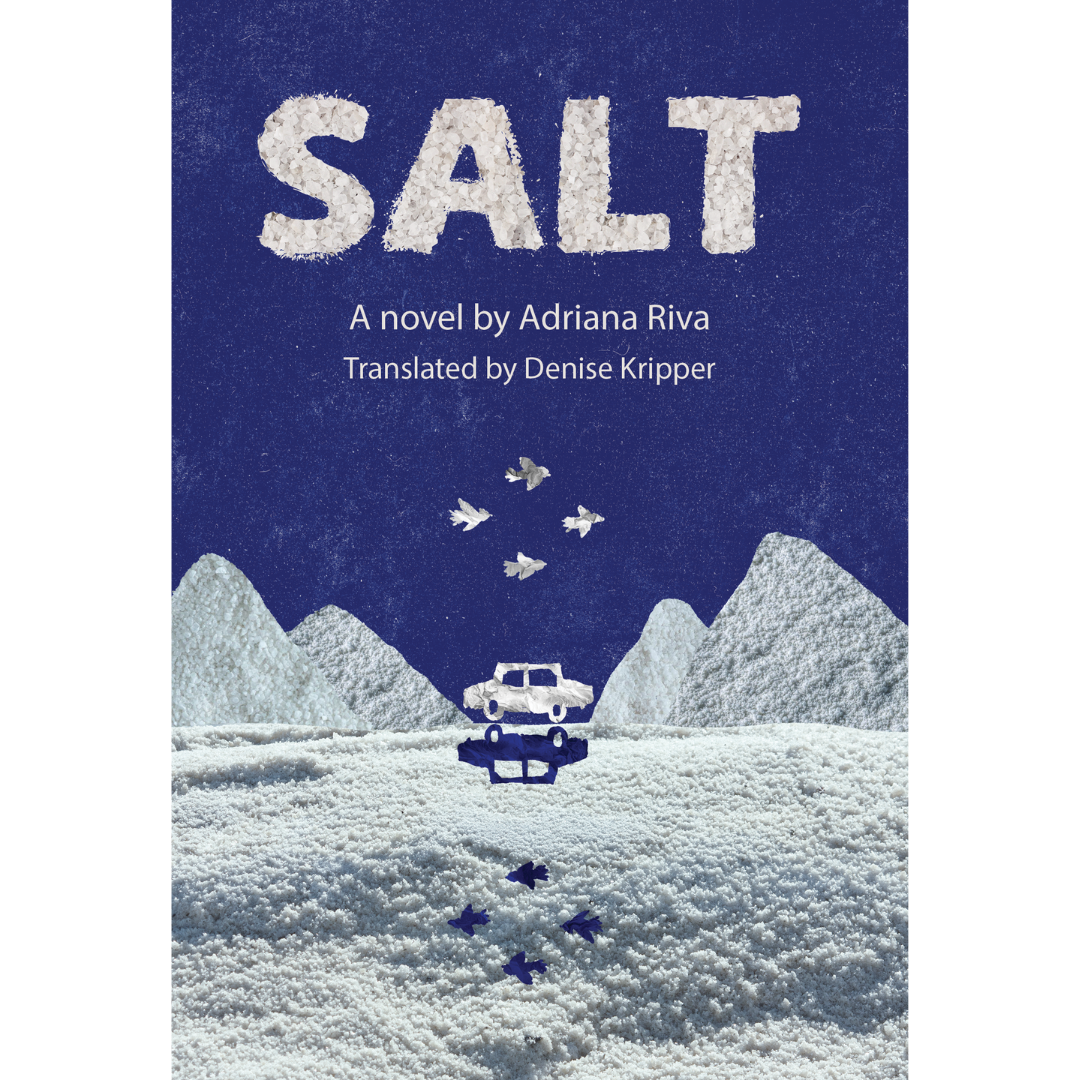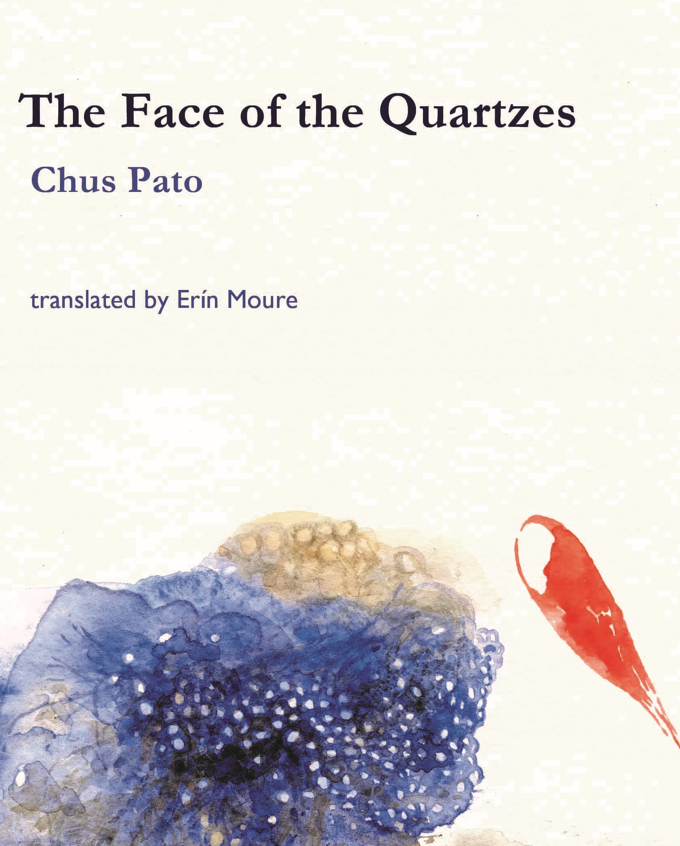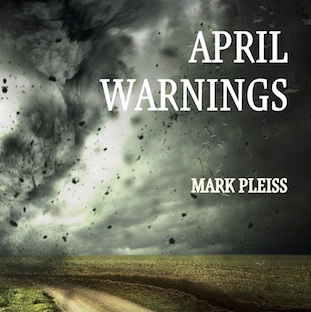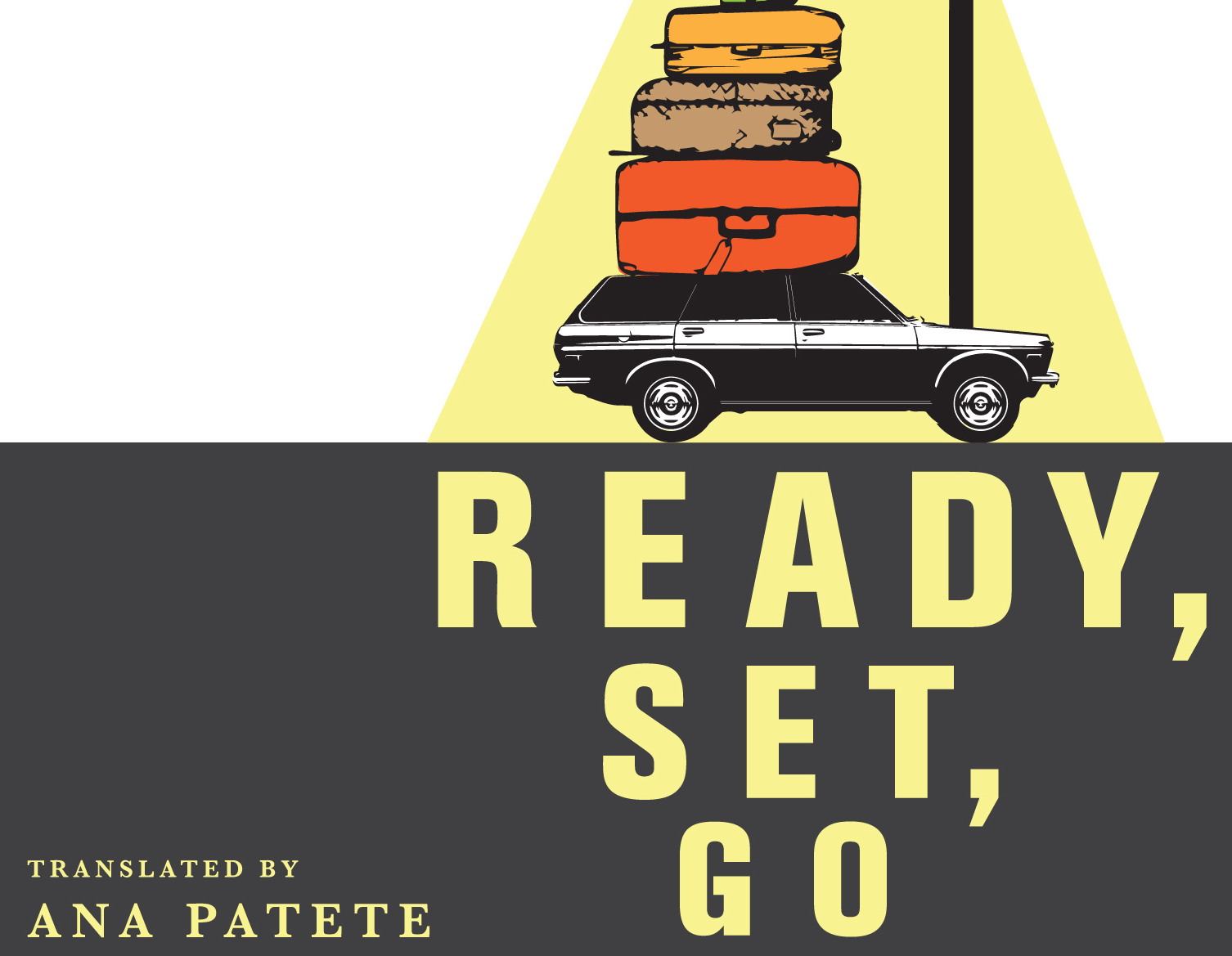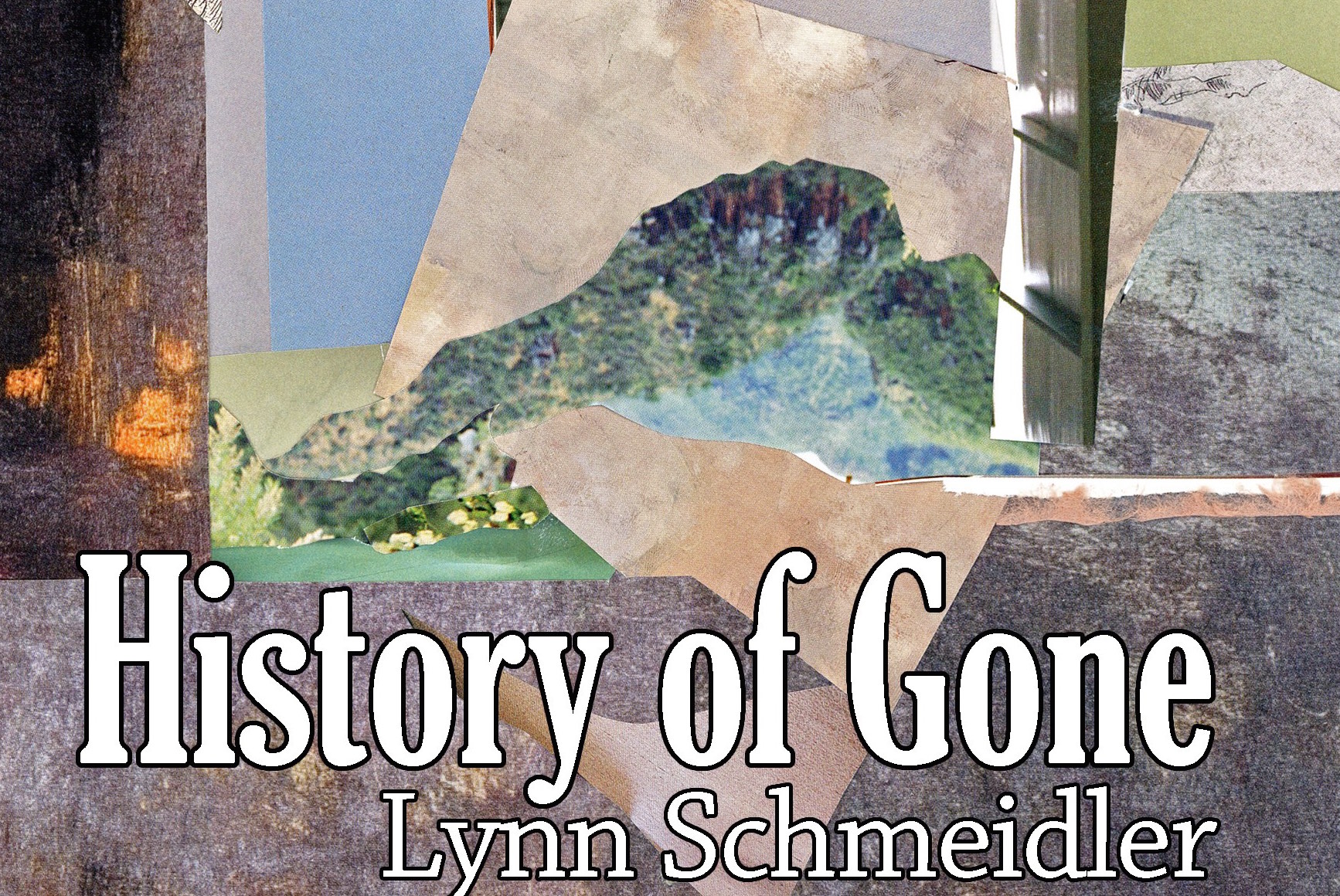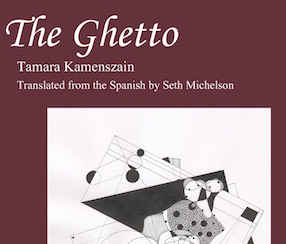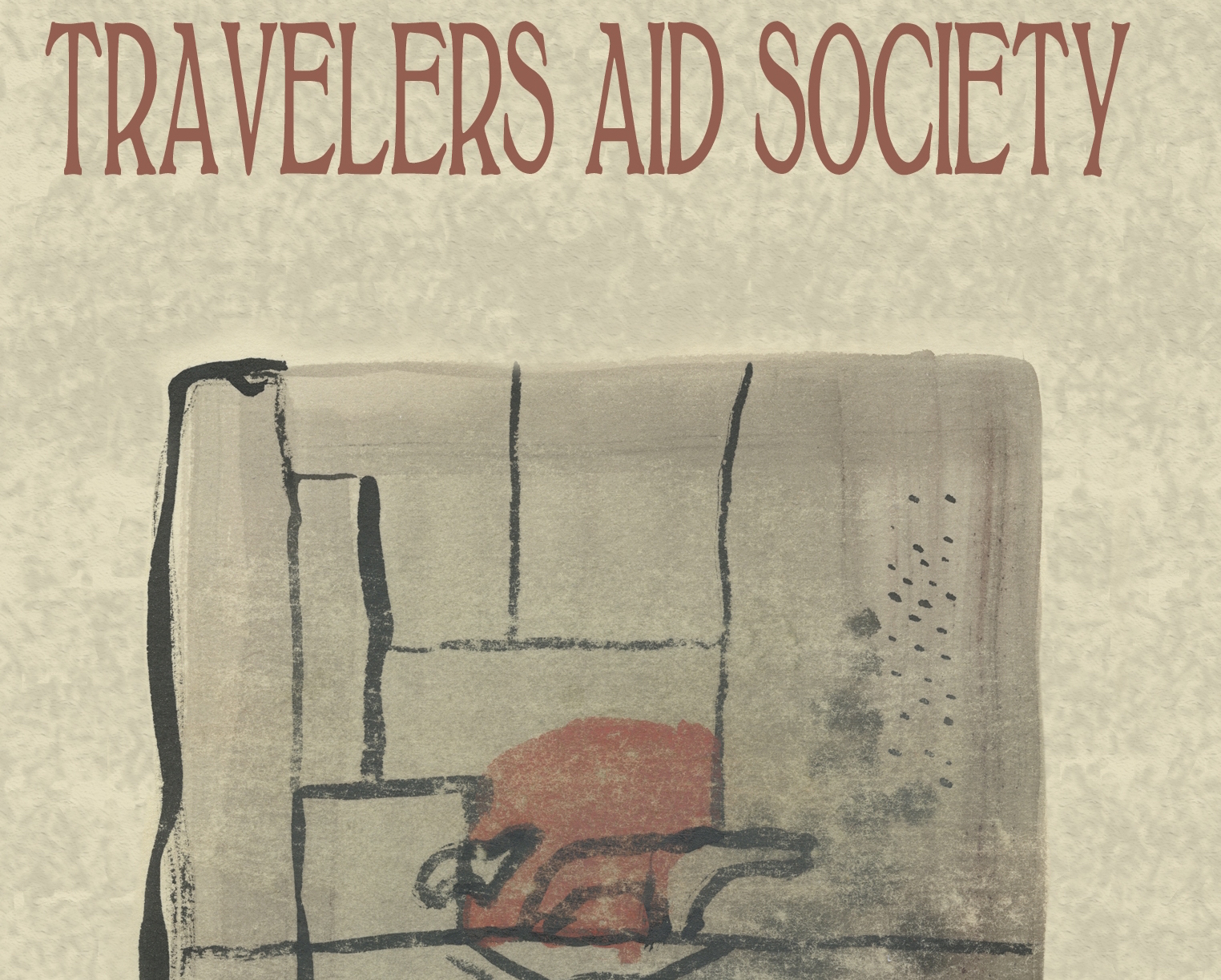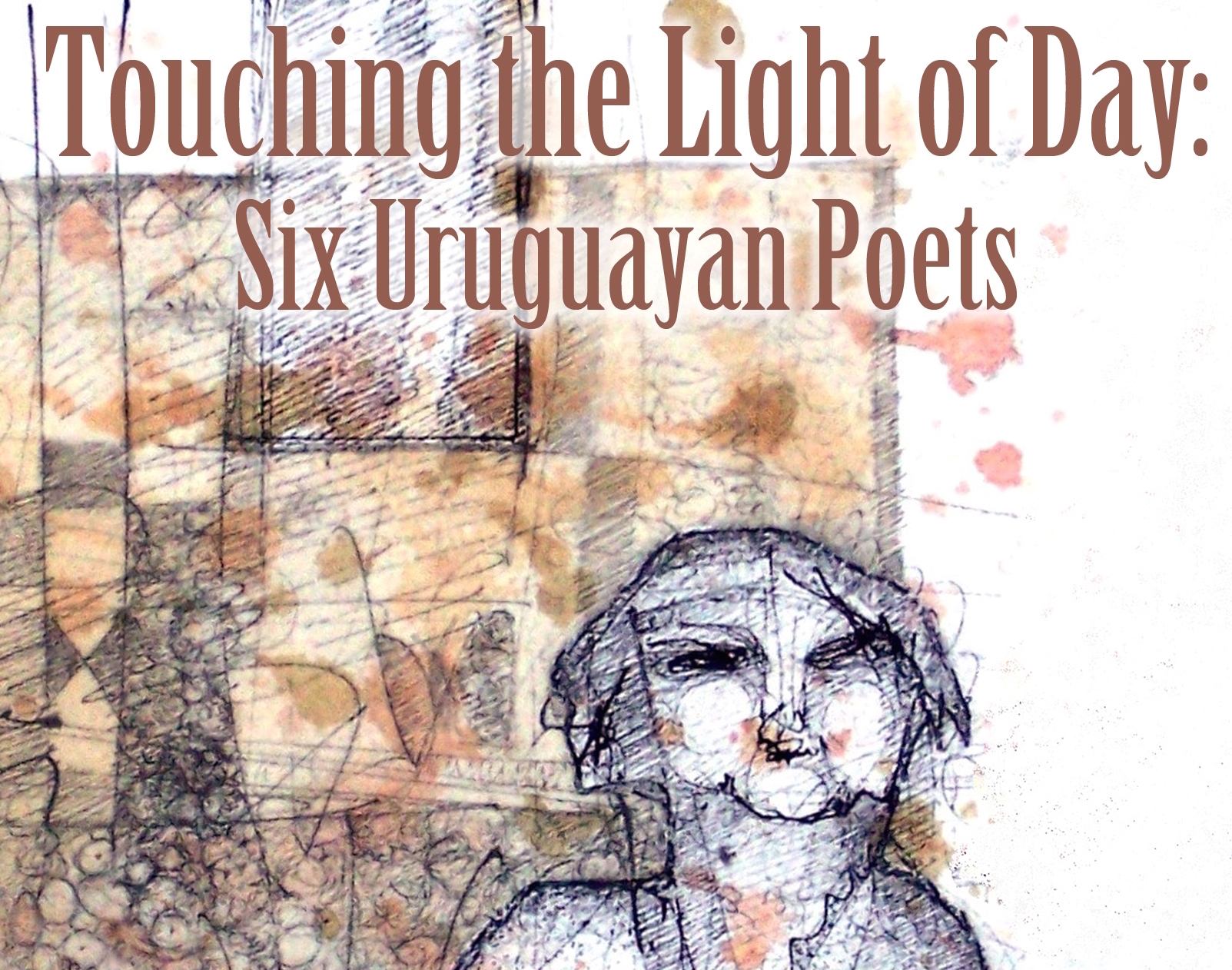dis tanz
Inna Krasnoper’s debut English-language poetry collection dis tanz is an unfolding space of movement and transition, tracing questions of identity, language, and belonging. These poems insist that communication is a process and ask for an active mode of reading and localizing oneself. dis tanz is a book that problematizes the gaps between languages, but also looks for points of contact, and the means for becoming proximate.
PRAISE FOR DIS TANZ
Here is a writer about whom the usual questions—What language does she write in? Where is she from?—cannot easily be answered. Her work brings to mind the humor of Ivan Blatný’s multilingual poems, Gertrude Stein’s play with repetition, John Cale’s “Cordoba” collaged from a Spanish-language primer, the vocab-poverty of Samuel Beckett, and the contemporary cross-language experimentation of Ida Börjel, Eugene Ostashevsky, Cia Rinne, and Uljana Wolf, to name a few. Migration, war, and the crises of nation-state and mother-tongue set the stage for Krasnoper’s uneasy dance of and with language, as waves of identity’s fetters crash against the shores of yet-undiscovered blue islets of a future Babel.
—Matvei Yankelevich, author of Dead Winter
Inna Krasnoper’s material, rhythmic, punning, and playful dis tanz is a true work of translingual and transnational poetry. It plunges us into the environment of its language the way a nightclub plunges us into the environment of its music. Its columns of parallelisms connect words by sound and estrange their sense. Its unsettled English unsettles English. What’s it like to be a person without a country? This is what it’s like.
—Eugene Ostashevsky, author of The Feeling Sonnets
The acrobatic dalliance of Inna Krasnoper’s dis tanz will “now you” into the withness of linguistic encounter—a here-there between “any one and any other.” Heady repetition, with inexact glosses between English, Russian, French, and German, enacts an endless “umzug” of the speaker’s interlingual situation. With cheeky temerity, “she and her stunt double” render authoritarian orders—narrative, linguistic, temporal, or sociopolitical—absurd in a Chto-Delat-inflected, Pussy-Riot-styled exhibition. What appears as anarchic rupture I am “up to my ears in” is a mode of reaching across distances for relationship: “there is this liking,” letter to letter, a fatiguing but necessary effort for a multilingual speaker dedicated to questions of be/longing. This book entices us to “be long” here, reach back, and “bare with me / bear with me” the aporia of our crossings.
—Leah Nieboer, author of Soft Apocalypse
ABOUT THE POET
Inna Krasnoper is a poet, artist, and literary translator born in Ufa (Bashqortostan) and based in Berlin. She graduated from the Chto Delat Collective School of Engaged Art in Saint Petersburg and holds a BA in Dance, Context, Choreography from University of the Arts in Berlin. Her Russophone poetry collections include Нитки торчат (Loose Threads), published by the Voznesensky Center in 2021, and Дорогой человек (Dear Person), published by Novoe literaturnoe obozrenie in 2024. Her English-language poetry has appeared in her chapbooks Over Sight (Eulalia Books, 2024) and Sealed (Black Sunflowers Poetry Press, 2024), as well as in Annulet, Vestiges, Ghost Proposal, Gulf Coast, Poetry Daily, Pocket Samovar, Oversound, SAND, 128 LIT, TILT, and elsewhere. dis tanz is Krasnoper’s first full-length poetry collection.


The Star-Spangled Brand
The Star-Spangled Brand by Marcelo Morales, translated by Kristin Dykstra, is a collection of prose poetry which tracks a city that changes–unless it does not. He began the book's composition during the 2010s with a long poem, "The Swan II," reflecting on everyday life and history in Havana. At the time, the world viewed Cuba as undergoing profound transformation. The end of this decade involved more large-scale shifts and conflicts, many driven by north/south relations. How would new events sculpt spaces around the love, fear, and needs of one single citizen?
PRAISE FOR THE STAR-SPANGLED BRAND
Marcelo Morales is a Chris Marker of Cuba. His groundbreaking prose poetry unfolds like film, from his double nation-state consciousness—Cuba and the US. It is saturated with fast-paced montage of snap-shot historical memory and the reality of economic-embargoed utopia. His “two nation-states” vision across the ocean plays the role of a foreigner in Florida, documenting and translating the paradise of gun violence and xenophobia. The Star-Spangled Brand in Kristin Dykstra’s brilliant translation is unforgettable and vital. It will make you feel what Morales feels: “the power of two nation-states on the back of my neck.”
—Don Mee Choi, author of Mirror Nation
The poetry of Marcelo Morales is a revelation. Through the eyes and words of a rare talent, the poems in The Star-Spangled Brand illuminate the complexities of being Cuban. Kristin Dykstra’s stunning translations in this bilingual edition provide readers access to Morales’s singular lyric weave of classic, modern, and postmodern literary allusions with the languages of everyday Cuban life inside and outside of Cuba. The collection charts a poetic journey through the relationship between Cuba and the United States—the “two nation-states on the back of my neck,” in Morales’s words—and interactions between their ordinary citizens. This journey includes President Barack Obama's historic March 2016 visit and the Trump administration’s November 2017 reversal of policies, events whose backdrop is the island’s serial economic crises beginning with the post-1989 “Special Period” into the global pandemic of the 2020s. In this book, the poetic speaker’s initial identity as a Havana driver and guide during a period of US tourist influx—a role once held by Morales himself—marks the speaker’s personal, political, geographic, and learning journey, which in the collection encompasses Havana, Florida, Vermont, and Uruguay. This trajectory that begins in a car evokes not only classical travel narratives but also the twentieth and twentieth-first century trope of the road movie, a genre that thrived in Cuba from the 1990s into the 2010s in film and narrative fiction. In The Star-Spangled Brand, the interior facet of this quest assumes a labyrinthian quality, as Dykstra brilliantly traces in her essay accompanying the poems. Through this journey, Morales’s poetic speaker navigates his own shifting views of the US and his changing relationship to the English language. Readers are in for a rich verbal feast as two gifted creators—poet Marcelo Morales and translator Kristin Dykstra—come together in these pages.
-Vicky Unruh, co-editor, with Jacqueline Loss, of The Cambridge History of Cuban Literature
ABOUT THE POET
Marcelo Morales (b. Cuba) began to write at the end of the “Special Period,” a euphemistic phrase referring to a time of economic, political, and social crisis in Cuba resulting from the collapse of the socialist field. In his poetry, Morales sifts through historical, political, economic, and material conditions that shape human experience. El mecanismo mudo, his extended collection of new prose poetry of which The Star-Spangled Brand is one segment, is forthcoming from Varasek Ediciones in Madrid. Morales is also the author of The World as Presence / El mundo como ser, a bilingual poetry edition from the U. of Alabama Press (2016, longlisted for the National Translation Award). His previous books of prose poetry include El círculo mágico, El mundo como objeto, Cinema, and Materia, among others; his novel, La espiral, appeared in 2006. He lives in Havana. BOMB published a 2017 interview in which Morales discusses writing, as well as his own photographs (https://bombmagazine.org/articles/marcelo-morales/).
ABOUT THE TRANSLATOR:
Kristin Dykstra is a writer, literary translator, and scholar. She is the author of the prose poetry collection, Dissonance, winner of the Phoenix Emerging Poet Book Prize (The University of Chicago Press, 2025). Veliz Books published her translation of Amanda Berenguer’s collection, The Lady of Elche, in 2023. Dykstra is principal translator of The Winter Garden Photograph by Reina María Rodríguez, winner of the 2020 PEN Award for Poetry in Translation and finalist for the National Translation Award. Her translation of 13 lunas 13, by Tina Escaja, won a Gold Medal from the International Latino Book Awards program (2023). She held a National Endowment for the Arts Fellowship in Literary Translation for her translation of Rodríguez’s Catch and Release included within the bilingual edition, Jigs and Lures, from Alliteration Publishing.



The Confines (AVAILABLE FOR PREORDER FEB 2025)
Fresh and provocative, the twelve stories in The Confines by Anu Kandikuppa deliver us into the cultural expectations, hierarchies, and taboos that define and limit our lives, especially the lives of women. A man's seemingly innocent gesture at a party unravels buried tensions in a marriage. A grieving doctor chronicles the peculiar ailments of an elderly couple yearning for their absent son. A young woman wrestles with her unrequited attraction to a colleague. Set in India and the U.S., these elegant and rare stories explore love, loss, and resilience, uncovering the compromises and hopes that shape our search for happiness.
PRAISE FOR THE CONFINES
“Inviting, expansive, and prismatic, Anu Kandikuppa’s THE CONFINES is anything but limited. Her sharply observed stories unfold in ever-surprising directions as her characters strain against the narrowness of their lives and their marriages. A nuanced portrait of women navigating old constraints and fresh expectations, THE CONFINES introduces a voice whose promise and powers are vast.”
—Sarah Shun-lien Bynum, author of National Book Award finalist Madeleine Is Sleeping, Ms. Hempel Chronicles, and Likes
“The sharp-edged stories in this smart and original collection are characterized by memorable girls and women whose desperation not to let life get the best of them is palpable; I read each of these psychologically complex portraits with my breath caught in my throat. An impressive debut.”
—Vauhini Vara, author of Pulitzer Prize finalist The Immortal King Rao and This is Salvaged
“From the first very captivating, subtly funny story, Anu Kandikuppa writes engrossing, thoughtful fiction that delves below the surface of ‘model minority’ lives. Reminiscent of Anne Tyler’s lovably maladjusted married couples, Kandikuppa uses a compassionate and irreverent view of marriage to illuminate Indian diaspora. You will enjoy this book.”
—Chaya Bhuvaneswar, PEN/Bingham finalist author of White Dancing Elephants: Stories
“Anu Kandikuppa writes with glorious precision about unhappy marriages and the quiet desperation of middle-class life in America and India. In one of these darkly comic stories, we see a man’s attachment to his wife: ‘He felt awed by her intellect, energized by her discontent.’ The brilliant gloom of THE CONFINES thrilled me. Read this collection to behold a marvelous literary alchemy—the characters’ gripes become gems. Their loneliness keeps us company, and their dissatisfaction transforms into our delight.”
—Polly Rosenwaike, author of Look How Happy I’m Making You
“An infinitely compelling collection of stories that captures the small gestures and tectonic shifts in families and communities. Throughout THE CONFINES, Anu Kandikuppa observes detail with precision and with a sly ironic wit. The worlds around her characters shimmer with a longing for connection, affection, and a place that genuinely feels like home. What a lovely book this is!”
—David Haynes, author of Martha’s Daughter (forthcoming in April 2025 from McSweeney’s)
ABOUT THE AUTHOR
Anu Kandikuppa (she/her) has worked as an engineer, a software developer, and an economics consultant. The social structures of South Indian families among which she grew up inform the stories in The Confines, her first book. Kandikuppa’s fiction and essays have appeared in Colorado Review, Michigan Quarterly Review, New England Review, The Cincinnati Review, Story, and other journals. Her work has thrice received special mention in the Pushcart Prize anthologies and has also been recognized by fellowships and residencies by the Virginia Center for Creative Arts and The Ragdale Foundation. In 2024, she received a Massachusetts Cultural Council grant for Creative Individuals. Kandikuppa holds a Ph.D. in Finance and an MFA in Writing from Warren Wilson College. She lives outside Boston. The Confines is Kandikuppa’s debut collection.


Brid
BRID by Lauren Shapiro explores motherhood, the dissolution of a marriage, and grief through the lens of a shrinking pandemic space. Through a structure that alternates narrative prose poem passages with lyric poems utilizing space on the page, the form attempts to both compress and expand, mimicking the psychological space of the narrator as she moves through these difficult times. BRID examines how relationships change over time—between children and parents as well as couples, and including the narrator’s own relationship with herself and her body.
PRAISE FOR BRID
Lauren Shapiro’s Brid is both an intense examination of family life during the pandemic and an extended ars poetica on the role of the artist and the ability of words to accurately represent things that populate the world around us. Even this collection’s title is a meditation on the ways language reflects error, “The word bird a mistaken spelling of the original brid. Mistakes channel a world, a worldview. A tear in a web that becomes an ocular hole. A tunnel into new brightness.” In this collection, Shapiro captures a child’s point of view with stunning clarity while also providing readers with a parent’s perspective on isolation, betrayal, and survival. “Even this poem, a distraction / from disaster, knows its limits,” states “Is Money Made from Trees? my daughter asks.” Brid examines unlikely guideposts such as the changing face of a nearby house seen in different kinds of light, chronicling vulnerabilities yet ultimately residing in a place of newfound wisdom and power.
—Mary Biddinger, author of Department of Elegy
“I think I’ve always been / a gate,” Shapiro writes in Brid, her beautiful, deeply moving book. Situated during the pandemic’s sanctioned isolation and the resulting forced familial unity, Brid is poetry written by a poet whose faith in language is slipping. The blood of the book is the melancholy of life’s routine, the intense awe of listening to children invent words, and the bifurcated grief of seeing the world in crisis while your own life is caving in.
With photographs of the house next door and her children’s sculptures and drawings—things that could not be closer—we somehow feel estranged. “Writing was a necessary first step,” Shapiro writes, leaving it at that. Teasing us with a cliffhanger. When we’re young language is salvation, but what happens next? “The older I get / the fewer words I need,” she writes. Wow. This is a new power. I love how this book scares and soothes me.
-Sommer Browning, author of Good Actors
ABOUT THE POET
Lauren Shapiro is the author of Arena (CSU Poetry Center, 2020), listed as a top poetry book of 2020 in The New York Times, and Easy Math (Sarabande, 2013), which was the winner of the Kathryn A. Morton Prize and the Debut-litzer Prize for Poetry. With Kevin González, she co-edited The New Census: An Anthology of Contemporary American Poetry (Rescue Press, 2013). Chapbooks include House (forthcoming 2024, Finishing Line Press) and Yo-Yo Logic (DIAGRAM/New Michigan Press, 2012). She has translated poetry and prose from Spanish, Italian, Vietnamese, and Arabic into English; her translation of Zaira Pacheco’s Despertar en el Sahara will be published by Eulalia Books. Shapiro is an associate professor of English at Carnegie Mellon University.


Salt
Ever since a childhood accident, Ema has doubted her bond with her mother, equally troubled and fascinated by her. Years later, now with questions about her own motherhood, she joins a family road trip to her mother’s hometown to quench her need for answers. With deceptively simple language, precise brevity, and vivid imagery, Salt explores daughterhood and unearths a family’s intricate past and secretive present. An intimate, brilliant debut novel by Argentine author Adriana Riva, translated by Denise Kripper.
PRAISE FOR SALT
“Swiftly moving and completely captivating, beautifully translated by Denise Kripper, Salt traces its narrator’s life from a harrowing accident through a long spiral of unknowing to a gorgeously rendered reckoning and rebirth. Fascinating and wonderful.”
-Jennifer Croft, author of The Extinction of Irena Rey
“To enter into Salt, this moving novel, one has to approach it in the same way the narrator engages with her mother: with caution, acknowledging one’s own fragility, to keep from breaking into pieces. In this text, words are at once a blow and a relief. Adriana Riva’s use of language is sharp and spontaneous, without a hint of artifice—her narrative is alive, beating and breathing intensely; emerging from a place where emotions, while expressing recognizable feelings, seem to be born anew.”
-Margarita García Robayo, author of The Delivery (translated by Megan McDowell)
ABOUT THE AUTHOR
Adriana Riva was born in Buenos Aires in 1980. In 2017, she published the short-story collection Angst (Tenemos las máquinas), in 2019 the novel La sal (Odelia), and in 2022 the poetry collection Ahora sabemos esto (Rosa Iceberg). She co-founded the children’s publisher Diente de León, for which she wrote the illustrated books Entre las hojas que cantan, La sartén por el mango, Contar Buenos Aires, and Sol mayor. She is the co-editor of the literary magazine El gran cuaderno. She has three daughters.
ABOUT THE TRANSLATOR
Denise Kripper is an Argentine literary translator and translation scholar. She is the translation editor at Latin American Literature Today and the author of Narratives of Mistranslation: Fictional Translators in Latin American Literature (Routledge, 2023). She lives in Chicago, where she is a founding member of the Third Coast Translators Collective.
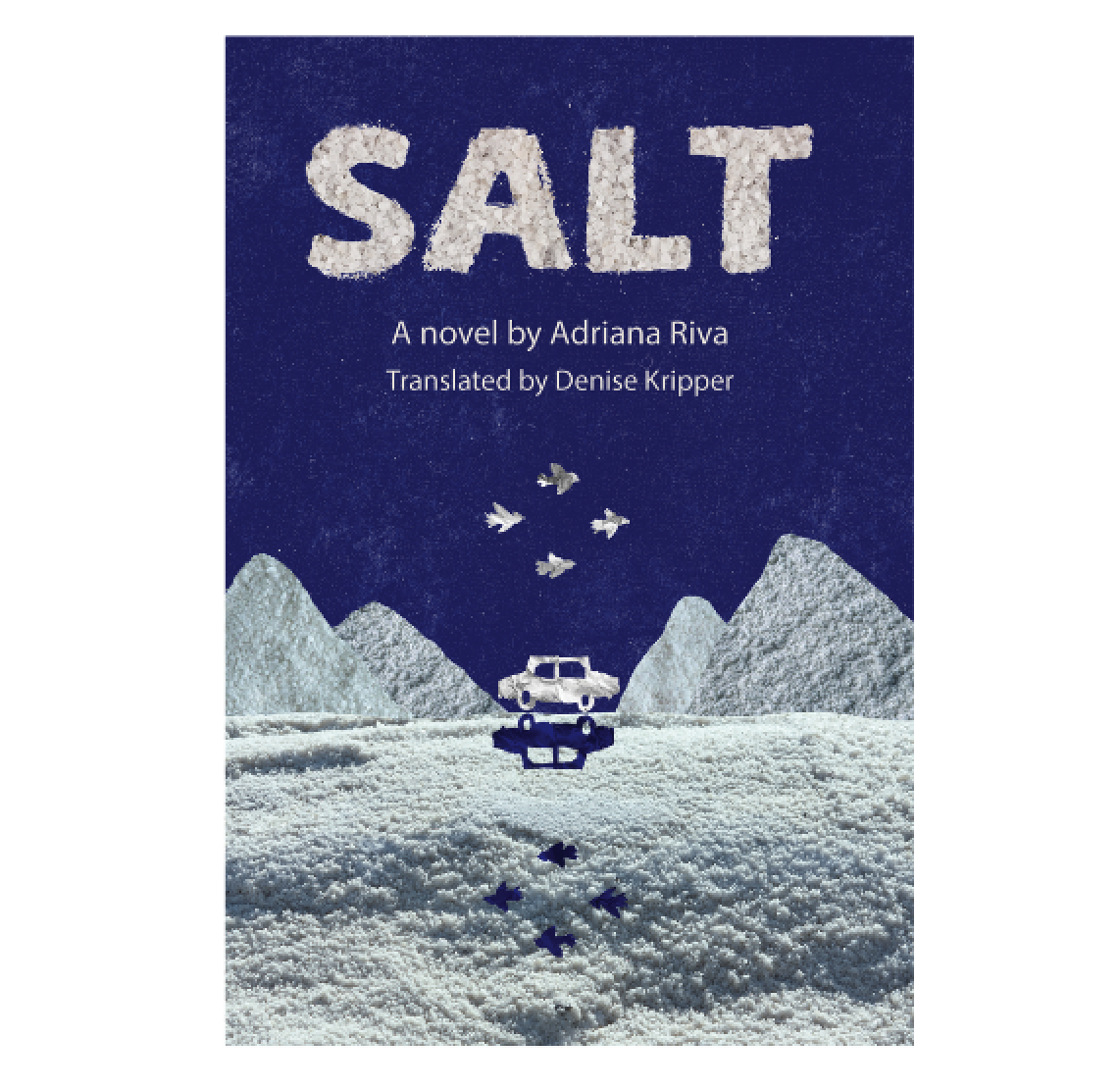


The Hole in the Ocean
Reading like two measures of Lucia Berlin and one of Nikolai Gogol, The Hole in the Ocean is a stunning debut from a retired professor of Spanish. Kathleen March's brief and intimate stories keenly tease mundanity into existential, stark, and oftentimes hilarious buoyancy. A remarkably unique and profound collection.
PRAISE FOR THE HOLE IN THE OCEAN
Lonely yet conversational, Kathleen March's The Hole in the Ocean hums to an ancient, choral song. Art, food, travel, dreamed and remembered from home in Maine, are subtly keyed to an unapologetic interiority that in some stories bends toward a singular female surreal.
—Kirstin Allio, author of the novel Buddhism for Western Children
The Hole in the Ocean is utterly original and captivating: Kathleen March is the best of guides, inviting her reader into a vivid dream of stories—each brief, lavish voyage rich in color and texture and connected by delicate threads to the next, until you realize you've somehow traveled across shimmering reaches of time and space. She reminds me of Colette—indelible impressions made with the lightest and most daring hand. Pleasure, heartbreak, solitude—and solace—all are inseparable here: the best of companions in this writer's vision.
—Marjorie Sandor, author of The Secret Music at Tordesillas
Delicately weaving cultural identity with personal journey, The Hole in the Ocean dives deep to explore a landscape of the interior with keen sensitivity navigated through introspection.
—Aimee Parkison, author of Disappearing Debutantes, Surburban Death Project
ABOUT THE AUTHOR
Originally from western NYS, Kathleen March has lived in Maine since 1984. Professor Emerita of Spanish from the University of Maine, she has traveled the long road from literary criticism to creative fiction with the help of translation. She now translates exclusively from the Galician language. Along the way, she has found art, especially printing, to be her favorite companion. Without thousands of miles of voyages, her stories would never have been written. She calls both shores of the Atlantic - Maine and Galicia - her home.


The Lady of Elche
During Amanda Berenguer’s lifetime, The Lady of Elche was one of her most acclaimed collections of poetry. The many faces surfacing through its portraits hint at her multifaceted poetics writ large. Dazzling landscapes exhibit her characteristic curiosity about the world, merging past with present. Berenguer pointedly cycles her mythological navigations of the surface toward revelations of a counterforce: other knowledge percolating below. And so it is not only the ancient Iberian sculpture known as “La Dama de Elche” that she unearths. Berenguer descends in search of images silenced by the neofascist Uruguayan dictatorship of 1973-1985, whose exercises in annihilation and complicity still impact public life today. Presented here in its first bilingual edition, the 1987 book drips with prophecy still relevant to our own time.
PRAISE FOR THE LADY OF ELCHE
Amanda Berenguer’s poems from the 1980s collected under the title of The Lady of Elche are, like the unburied sculpture of the title, an enigma of identity, history, and memory constructed through shards of language cutting through time and space. The poetic voice emerges in Montevideo, in Spain, in the Grand Canyon, in New York, in search of self and connection. Berenguer’s images are as jarring and blunt as the “mandrake moon,” which “stuck nightmares / and perversion into both sockets of my eyes,” and as haunting and fluid as “an oscillating forest of submerged cadavers / feet shackled in cement cubes.” Dykstra’s phenomenal translations are works of art themselves, poignantly rendering Berenguer’s shifting registers and movement through the far reaches of modernity into English-language poetry. The “nervous memory-fish” of Berenguer’s challenge to the would-be censors of the Americas flit through the waters of our shared, violent history, emerging from its depths to demand a reckoning that is seemingly forever displaced.
—Juliet Lynd, scholar of contemporary Latin American literature and culture
Amanda Berenguer presents the poet’s voyage as a vocable consumption, an entity of substrate listening. Over the course of these pages, in a mounting inevitability of humanity, Berenguer positions the embodied self as a new self—a ravenous becoming towards a breathless forage into the temporal, “a limitless birthing between silence and voice.” Kristin Dykstra’s sensuous translation reveals an essential prophecy of ownership within witness and cadence. The Lady of Elche is a call for us to stop at each precipice as newborn deities, “spectra of light rays,” to incorporate all we experience into our language, more importantly, to realize that true revolution is inherent within those footsteps.
—Edwin Torres, author of Quanundrum: [i will be your many angled thing]
ABOUT THE POET
Amanda Berenguer (1921 - 2010) was a vital presence in Uruguayan literary life for more than six decades. Berenguer is the most multifaceted, restless poet of the “Generation of 1945,” known around the world for its energetic experimentation. Her first book appeared in Montevideo in 1940, followed by a steady stream of collections recognized for their excellence. Among her awards for La Dama de Elche are a first prize for poetry from the Uruguayan Ministry of Education and Culture, first prize in the competition overseen by the Montevideo City Council, and the national Bartolomé Hidalgo Prize for the second edition of the same collection in 1990. Berenguer’s lifelong dedication to the arts included work with little presses and radio programming, as well as collaborations with dancers and musicians. In 2019 Ugly Duckling Presse published Materia Prima, a bilingual anthology introducing highlights from Amanda Berenguer’s poetic career to readers of English. The Lady of Elche is the first individual poetry collection by Berenguer to appear in full in English.
ABOUT THE TRANSLATOR
Kristin Dykstra is a writer, literary translator, and scholar. Dykstra is principal translator of The Winter Garden Photograph (Ugly Duckling Presse), by Reina María Rodríguez, Winner of the 2020 PEN Award for Poetry in Translation and Finalist for the National Translation Award. With Kent Johnson she co-edited Materia Prima, a team-translated anthology featuring Berenguer (also from Ugly Duckling), Finalist for the 2020 Best Translated Book Award. Previously Dykstra translated collections by Rodríguez, Juan Carlos Flores, Marcelo Morales, Ángel Escobar, Tina Escaja, and others. Her poetry collection Dissonance: Its Ridgelines / Disonancia: Perfil de laderas, is forthcoming in a bilingual edition with translations by Escaja; excerpts appear in Lana Turner, Almost Island, Clade Song, and Seedings; and bilingually in La Noria, El Nieuwe Acá, Distropika (all with translations to the Spanish by Escaja) and Acrobata (translated into Portuguese by Floriano Martins).
Cover art: “Incandescent Montevideo,” Kristin Dykstra’s adaptation of a 1932 photograph of Montevideo held in the public domain by the Centro de Fotografía de Montevideo (Autor: S.d., Código de referencia: 05789FMHGE)



Particles of a Stranger Light
A memoir. A horror movie. A descent into hell. Particles of a Stranger Light, Anthony Sutton’s debut poetry collection, employs a wide array of approaches and forms to obsessively dissect issues of memory, identity, culture, and history. Circling around the trauma of a single night, these poems reach into the void to reclaim what has been lost.
PRAISE FOR PARTICLES OF A STRANGER LIGHT
“Anthony Sutton’s debut book is haunted by the old, existential question no one has yet been able to answer satisfactorily: Who or what am I? Rimbaud proclaimed, Je est un autre or I is another. Sutton updates Rimbaud with wry postmodern panache. In one poem, his I is a “Mixed White/Filipino Poet” who “Interrogates the Basic Notion of ‘Passing’ and then Accepts Being Read as a Latinx Woman.” In others, he is the zombie who has lost his identity after being “roofied.” He is also the person who knows “if I had a god to pray to // it would be the light fixture / in the jail cell I spent most / of a day in.” All I know is that I want to keep reading and rereading these lovely, strange, wise, and wise-cracking selves that Sutton invents for himself in Particles of a Stranger Light. This virtuoso book passes like a Category 5 hurricane through our consciousness and, if you let it, will rearrange who you are.”
—Donald Platt, author of Swansdown
“I wanted to finish the conversation,” Anthony Sutton begins—and we lean in to listen. Because it’s wonderfully weird here. I mean, how often do you find “C’mon and Show Me Something Newer than even Dante” listed three times in the Table of Contents, and each uniquely each? (And then the gracious, grateful owning-up later, the title—times three—is from Bernadette Mayer’s poem “Sonnet”). Plus in this mix: “A Small God Carrying Endless Light.” Amen. Which is to say: speaking of prayer, these poems godlessly slip and keep crossing a river to figure out, to understand. So this remarkable dream-worthy first book of poems rolls on, offering an imaginative real world that upends, sings, surprises and also somehow delights and unravels. Somehow because is there a way to explain the sweet overwrought “lightning bugs whisper electricity in the trees” or “someone else hands around / a box-wine from Kroger” patched up in a book with Icarus famously falling to water (“I actually don’t like Auden” blurted out pages hence) until it’s the lost boy—or maybe Sutton—saying “Words are not a sea. / They’re a river. // They have direction.” I’d agree with this poet that “Keats concurred.” Keats, whose ghost is everywhere here.
—Marianne Boruch, author of Bestiary Dark
ABOUT THE POET
Anthony Sutton resides on former Akokiksas, Atakapa, Karankawa, and Sana land (currently named Houston, TX), as an Inprint C. Glenn Cambor fellow at the University of Houston’s Creative Writing and Literature PhD program and teaches in the community for Grackle and Grackle. A recipient of a United States of Writing grant from Poets and Writers, Anthony’s poetry and criticism has appeared in guesthouse, Gulf Coast, Grist, The Journal, Prairie Schooner, Puerto del Sol, Oversound, Quarter After Eight, Southern Indiana Review, Zone 3, and elsewhere.
Cover art: “A Spark [that Spirals Out]” by Ronald L. Jones


Year of the Murder Hornet
Catalogue, essay, lament, Year of the Murder Hornet, Tina Cane’s new poetry collection, is a work born of tension. Juxtaposing the personal and the political, these poems navigate the uneasy terrain of the self amid an increasingly tumultuous and fragmented world. Taking up the poet’s mantle as seeker, Cane interrogates and wrestles with notions of personal narrative, theory, and truth, as well as our collective cultural realities. Year of the Murder Hornet is a book of this moment meant for all moments.
PRAISE FOR YEAR OF THE MURDER HORNET
In this fierce and enthralling book, Tina Cane records a time of pandemic and climate change, regimes and threats, murder hornets and dying seas, quarantine baking and leaf-blower protests, stimulus payments and food chains, gentrification and apps, conspiracies and personal theories, doom-scrolling and Great Conjunctions, fake narratives and disposable masks—and of sheltering in place when poetry is the only solace: the “iambic in the darkness.” Love is “a process of education” and memory “is a poet,” she tells us, making new paths for us to understand this painful time. With boldness and grace, Cane negotiates a tense present, a distressing future, and the wish for a “perfect past” tense. Her poems create a moving map so that we don’t struggle alone in our “personal weather” and remind us that we are also able to be “overpowered by flowering magnolias.”
—Camille Guthrie, author of Diamonds
We have, all of us, in recent years wandered into a spectacle, into some new, albeit strangely familiar, theater of cruelty. What rules of conduct can we possibly affirm? With genuine courage and in fierce measures, Tina Cane establishes a rule of heart and of vivid allegiances which I truly believe to be not only valid but redemptive. Year of the Murder Hornet, for all its ferocity, is a book of virtues and humane understanding. Here is poetry both urgent and durable.
—Donald Revell
ABOUT THE POET
Tina Cane is the author of the poetry collections Year of the Murder Hornet (Veliz Books 2022), Body of Work (Veliz Books, 2019), and Once More with Feeling (Veliz Books, 2017). She has also published the chapbooks Dear Elena: Letters for Elena Ferrante (Skillman Avenue Press, 2016) and The Fifth Thought (Other Painters Press, 2008), as well as the young adult novel Alma Presses Play (Penguin/Random House) . Cane serves as the Poet Laureate of Rhode Island where she is the founder and director of Writers-in-the-Schools, RI. She is the creator/curator of the distance reading series, Poetry is Bread.
Cover image and author photo by Cormac Crump
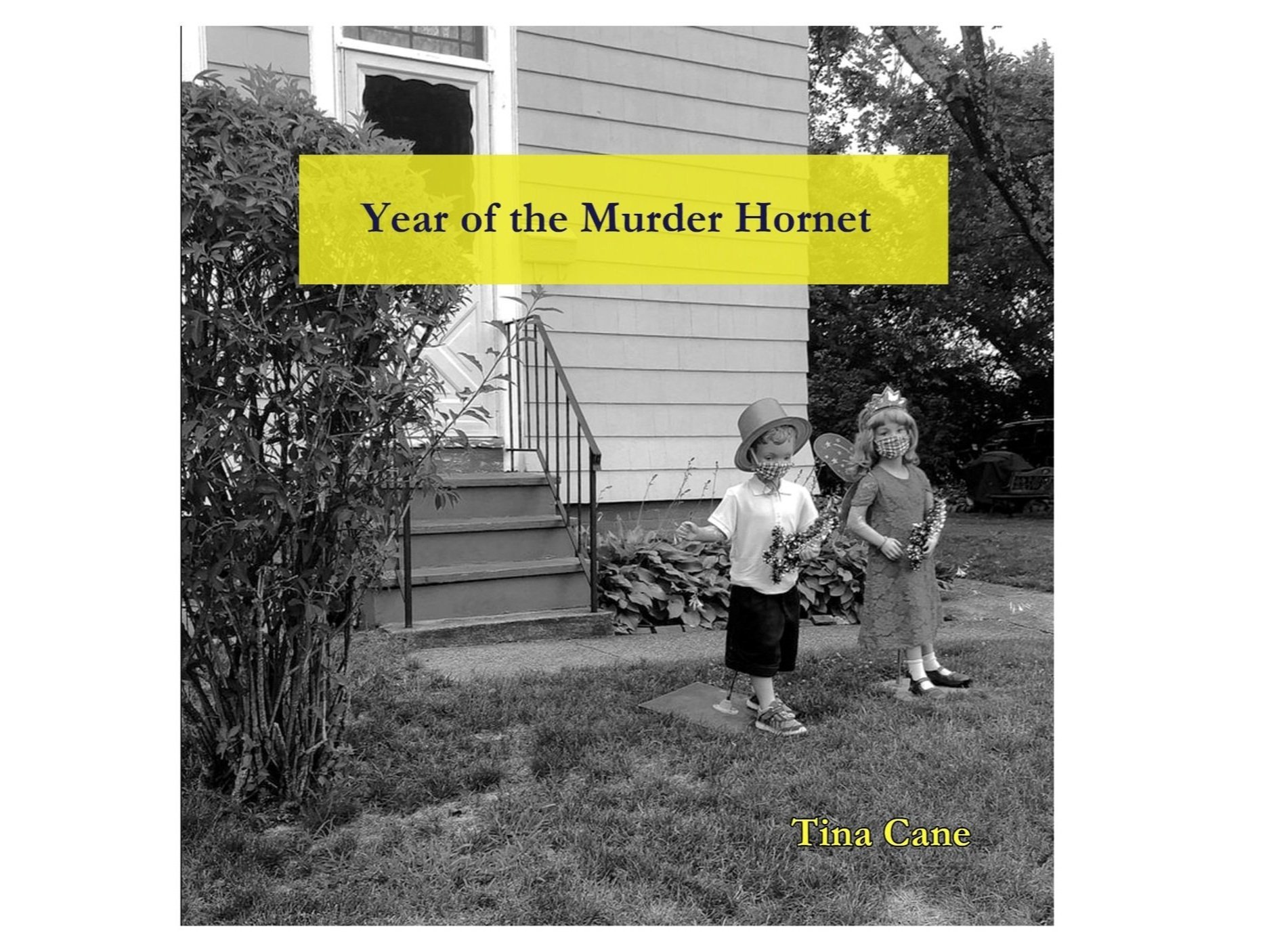

Splendid Anatomies
The very peculiar and human characters of Splendid Anatomies by Allison Wyss live in, on, and far beyond the periphery, learning to love themselves as they claim and reclaim their bodies. They get tattoos, have radical operations, wear prostheses, even dig bloody veins from their legs. They hack themselves to pieces. But then they stitch themselves back up--in ways that are both glorious and painful. These stories, set in the lands of fables, in other universes, and even the Midwest, are grotesque and gory, menacing and magical, sad, funny, and true celebrations of what it means to live.
PRAISE FOR SPLENDID ANATOMIES
In Splendid Anatomies, Allison Wyss examines the inherent strangeness of embodiment in all its forms, the different ways our physicality shapes who we are, and what we understand about ourselves and the world. The collection moves beyond genre to deliver tales that are by turns hilarious, disturbing, and poignant. A truly fascinating read.
—Emily Mitchell, author of The Last Summer of the World
—Kathleen Rooney, Minneapolis StarTribune
ABOUT THE AUTHOR
Allison Wyss has a thing about body modification, dismemberment, and fairy tales. Her stories have appeared in Alaska Quarterly Review, Cincinnati Review, Water~Stone Review, Moon City Review, and elsewhere. She has an MFA from the University of Maryland. Some of her ideas about the craft of fiction can be found in a column she writes for the Loft Literary Center, where she also teaches classes. Splendid Anatomies is her first book.
Cover image by Korey Rowswell
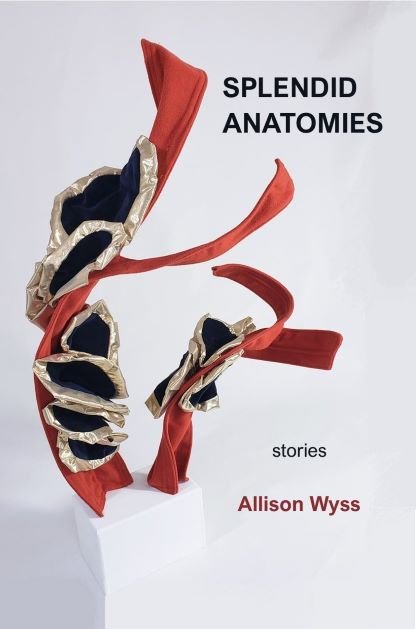

Share the Wealth
Share the Wealth trains a wry and closely-observing eye on chance, exploring a world in which we collectively stand always on the brink of change – for good or ill. Sometimes the roll of the die delights: Cherry leaves turn into tortillas, snowbanks wear makeup, and hotdog-sized caterpillars wander the night, munching pecan leaves. But death and hazard are present here, lurking beneath world's abundance – its overflow of bookstores, turkeys, paintings, freeways, and flowers. Still, these poems attune the reader to the strange riotous-ness of the universe, its wealth of natural abundance, sensory detail, and time. Balanced between gain and loss, these poems allow room for bliss as much as decay.
PRAISE FOR SHARE THE WEALTH
I’d call Maureen Thorson’s Share the Wealth quietly captivating, if it didn’t truthtell so insistently and open the mind with bright images that make familiarities like January, for example, more permanently real than they’ve ever been: “And last year’s flowerpots drift in the snowpack // burnt sugar dusk persistent non-roar / of the highway over the river /that uses the thick light like pomade.” Other moments skate by like Olympians, and you only recognize their power when they’ve left you behind, marveling, like this one tucked into an encounter with some skittish wild turkeys: “This world is chockablock / with death and joy and hazard, / and it would be right for a woman alone / to be its scariest thing.” These poems comfort and discomfit, coaxing weirdness out of the familiar, deep emotion out of the natural world, acceptance out of tragedy. You’ll find this book’s unique perceptions—for a moment, for good—will locate themselves somewhere in you.
—Kathleen Ossip, author of July
ABOUT THE POET
Maureen Thorson is the author of Share the Wealth (Veliz Books, 2022), On Dreams (Bloof Books 2021), My Resignation (Shearsman 2014), and Applies to Oranges (Ugly Duckling Presse 2011), as well as the chapbook Mayport, which won the Poetry Society of America's national chapbook fellowship for 2006. She lives in Falmouth, Maine.
Maureen Thorson’s website: maureenthorson.com
Cover image: Pyrus communis © Royal Charles Steadman (1923) U.S. Department of Agriculture Pomological Watercolor Collection. Rare and Special Collections, National Agricultural Library, Beltsville, MD 20705
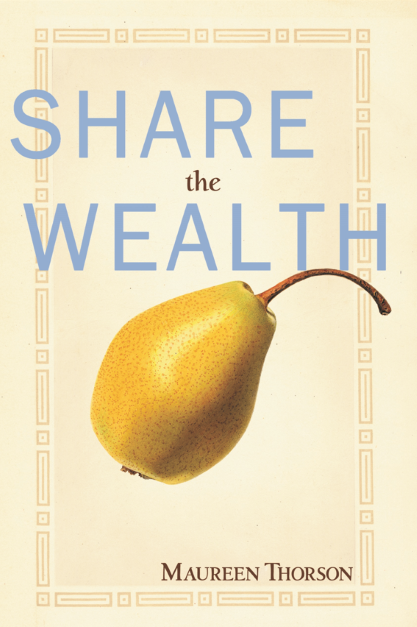

The Face of the Quartzes
In The Face of the Quartzes, her twelfth book of poetry and sixth to be translated by Erín Moure, Chus Pato creates a manual for living that is one with birds, with animals, with peaks and trains and lighthouses, and with women who undertake journeys toward life (the improper) and spring (renewal). Her poems acknowledge an unrequitable gift: that of poetry, the language of poetry, the possibility of poetry, its impropriety and its freedom.
The book includes an introduction (in part explaining why a book called Un libre favor ended up as The Face of the Quartzes!), a materials index, and a translation of an interview with Chus Pato by Peruvian poet Maurizio Medo.
ABOUT THE AUTHOR
Chus Pato is one of Europe's greatest contemporary poets, and an indispensable force in Galician and Spanish culture. All five books of the pentalogy Decrúa (Delve), translated by Erín Moure, have appeared in English: m-Talá, Charenton, Hordes of Writing, Secession, and Flesh of Leviathan. The original Hordes of Writing in Galician received the Spanish Critics' Prize in 2008 and the Losada Diéguez Prize in Galicia in 2009. In 2013, the Galician Booksellers' Association fêted Pato as Author of the Year. In 2015, she became the first Galician poet to be recorded for the sound archives of the Woodberry Poetry Library at Harvard University. Her work has been translated into Dutch, Bulgarian, Polish, Portuguese, Catalan, Spanish, and French, among other languages.
ABOUT THE TRANSLATOR
Erín Moure is a poet and translator who once wandered, and currently stays close to home in Montréal. Her translation of Galician poet Lupe Gómez, Camouflage (Circumference Books, 2019) was a finalist for a 2020 Best Translated Book Award. Her latest book is The Elements (Anansi, 2019) and her latest translations are Uxío Novoneyra's The Uplands: Book of the Courel and other poems (Veliz Books, 2020) from Galician and This Radiant Life (Book*hug, 2020) from the French of Chantal Neveu.
PRAISE FOR THE FACE OF THE QUARTZES
Erín Moure’s englishing of Galician poet Chus Pato’s newest work is a gift of gorgeous intelligence for all of us who crave the amplitude of the poem as a nascent site of freedom. This vast, concise book is a place to travel in the company of sybils in fleet canvas sneakers, wandering amazons, the girl Aphrodites of celestial republics, phantoms expelled from rusted hulls of ships, all of them lustily reading as they walk, and nonchalantly speaking philosophy with animals. For Pato, poems are contemporary with rust and tar and moss. They throw their voices into stones like ancestors. History is landscape and lives in the vocable.
—Lisa Robertson, author of The Baudelaire Fractal
Cover image by Vida Simon

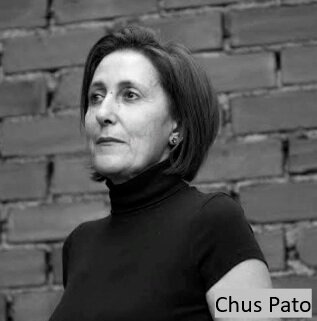
Photo by Xosé Gómez

Photo by Karis Shearer
Subjects We Left Out
In Naomi Washer's novel Subjects We Left Out, a young American writer begins translating the work of a French poet whose book bears striking parallels to her own life. Diffident despite her talent and thoughtfulness, she struggles to understand and speak to the people closest to her, especially Alex: an exchange student from Florence, whom she feels intimately connected to despite his elusive, almost aloof disposition. As she travels through Paris and rural northeast France to meet with the poet and pursue an idea for her own book, she reckons with the distance between herself and Alex and begins to speak of the life she wants for herself. A meditation on what is often said and unsaid between people—in silence, translation, interpretation, and miscommunication—and an account of an artist coming into her own, Subjects We Left Out is a novel that sees the reader as correspondent, inviting us to hear and be heard, see and be seen, and summon the courage to speak clearly.
PRAISE FOR SUBJECTS WE LEFT OUT
When a mirror is anything but a blueprint, what to do when you find both yourself and your muse reflected therein? The parallel lives contained in Naomi Washer’s Subjects We Left Out, which takes translation to its most appropriate and dreamy level, as well as the confluence of love, language, and the seemingly impossible task of making oneself understood and seen while attempting to keep true to the other and the self, will make this text—this deep and emotive study of living in the life lines of unknowing and reaching—required reading for those readers who know that love is inseparable from what we say, and what we mean.
—Jenny Boully, author of Betwixt-and-Between: Essays on the Writing Life
ABOUT THE AUTHOR
Naomi Washer is the author of TRAINSONGS (Greying Ghost Press), Phantoms (dancing girl press) and American Girl Doll (Ursus Americanus), and the translator of Sebastián Jiménez Galindo's Experimental Gardening Manual (Toad Press). Her work has appeared in Seneca Review, Passages North, Essay Daily, Asymptote, and other journals. She has been awarded fellowships and residencies from Yaddo, Vermont Studio Center, Studio Faire, Chateau Orquevaux, Numeroventi, and Columbia College Chicago where she earned her MFA in Nonfiction. In 2019, she was named one of 30 Writers to Watch by The Guild Literary Complex. She lives in Chicago where she is the editor-in-chief of Ghost Proposal.
Naomi Washer’s website: www.naomiwasher.com
Cover image by Laurence Briat.
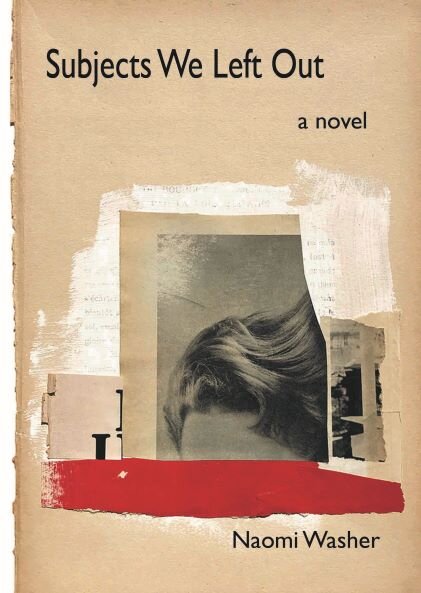
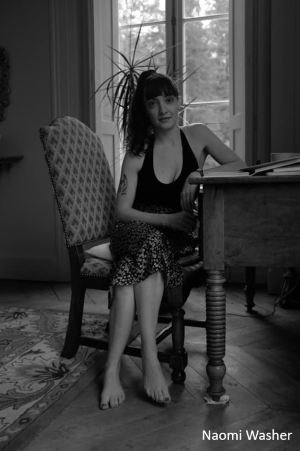
Photo by Karen Hook
We Do Not Live in Vain
We Do Not Live in Vain is the sixth book of Uruguayan poet Selva Casal (b. 1930). Drawing upon her academic training in sociology and her experiences as a penal lawyer, Casal lays bare the stark realities of the human condition: our capacity for violence and cruelty as well as our profound ability to love and care for one another. With keen observation, deep pathos, and imaginative playfulness, these poems of witness are ultimately an affirmation of human life and dignity even in the face of humanity's worst tendencies. Originally published as No vivimos en vano in 1975 during Uruguay's military dictatorship, this book solidified Casal's reputation as a political dissident and led to her losing her job as a sociology professor at the Universidad de la República.
PRAISE FOR WE DO NOT LIVE IN VAIN
To read this book is to have “the sea in your room,” so ample, multitudinous, impossible is Selva Casal’s language—and Jeannine Marie Pitas’s translation fearlessly rides the tumbling waves of image upon image, sound upon sound. But, reader, beware: below the current, there is an undertow that “grabs you by the feet and snatches you.” In Casal’s poetry, death is the other side of beauty. And not just death. but the horrific possibility of never even having been: the slowly dawning recognition that “there is no sea.” Yet as physics assures us, there is no nothing: even the most perfect vacuum is a fluster of particles and antiparticles blinking in and out of existence. Of course, if the human body entered this space, it would swell and explode. If any poetry dares to enter this dazzling and dangerous chamber, it is this.
—Michelle Gil-Montero, translator of The Annunciation by Maria Negroní
ABOUT THE AUTHOR
Selva Casal (born in 1930) lives in Montevideo, Uruguay and is the award-winning author of sixteen books of poetry, most recently Abro las puertas de un jardín de plata [I Open the Doors of a Silver Garden] (Trópico Sur Editor, 2014). A former penal lawyer, Casal is inspired by her experiences working with people who have faced injustice. Her 1975 publication of No vivimos en vano (We Do Not Live in Vain) during the military dictatorship in Uruguay resulted in her losing her position as a professor of sociology at Uruguay’s Universidad de la República. Her work has received prizes in Uruguay, Argentina and Mexico, such as the 2010 Premio Morosoli de Poesía given by the Fundación Lolita Rubial and the Premio Nacional del Ministerio de Educación y Cultura. Casal is also a painter and continues to write and paint daily. “Everything in life nourishes poetry,” she says. “Everything.”
ABOUT THE TRANSLATOR
Jeannine Marie Pitas is a Spanish-English translator, writer, and professor at the University of Dubuque, in Iowa. Her translation of Marosa di Giorgio’s I Remember Nightfall (Ugly Duckling Presse, 2017) was shortlisted for the 2018 National Translation Award, and she contributed to the translation of Amanda Berenguer’s Materia Prima (Ugly Duckling Presse, 2019), which was shortlisted for the 2020 Best Translated Book Award. She is the author of three poetry chapbooks and one full-length collection, Things Seen and Unseen (Mosaic Press, 2019). She is translation co- editor for Presence: A Journal of Catholic Poetry.
Cover art by Kaja Kwaśniewska

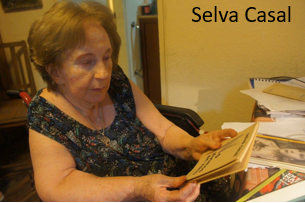

The Uplands: Book of the Courel and other poems
The great Uxío Novoneyra, Galician poet and man of the land, stands with Lorca as a poetic visionary of 20th -century Spain. He was devoted to his region, the mountainous Courel, to its variant of Galician and to its names and ways, as well as to Galician culture as a whole, to the expression of all minority cultures and to freedom from imperialism, war, and economic expansionism. His œuvre —rich in sound, syllable, silence and gesture— reveals him as an eco-poet before the concept existed. Os Eidos [The Uplands], first published in 1955 and still in print today, is his monumental work.
PRAISE FOR THE UPLANDS: BOOK OF THE COUREL AND OTHER POEMS
Novoneyra is a caesura where the world suspends its pulsing din and the world trembles and glows like a star. With him, we are a people who stride onward, and our striving is never in vain.
—Chus Pato, author of Secession
This is a magical book that conjures across seasons and seasonal creatures, vegetal growth and ashes. And especially, today, the draw to "head alone to an upland where I cannot be seen." There is no way you could have predicted it would be such a timely book, conjuring readers to the open air, sparsely populated, where risk of infection is slight. Or rather, could not have predicted the sheer scope of its timeliness, this moment when the full human population of the earth is suddenly sensitized to the movements of molecules in air, a sensitivity previously reserved for allergics, asthmatics, and other immune compromised beings, such as Novoneyra himself and his translator.
—Cheryl Emerson, SUNY Buffalo
ABOUT THE AUTHOR
Uxío Novoneyra (1930-1999) was one of the greatest Galician poets of the 20th century. Steadfast in defense of his Galician language and culture in the face of the homogenizing forces of centralist Spain, he produced a poetic œuvre rich in sound, syllable, silence, and gesture. He was a poet of Courelian Galician, a man of a remote mountain heritage and accent shaped over thousands of years before it arrived in his chest and mouth and on his tongue. Influenced by the medieval Iberian troubadours and by poetries from Persia and China to the Caribbean, through the Old Testament bumping against the Beats, Novoneyra was devoted to language and to all that speaks outside language but that language yearns to bring into mention. Having lived the brutal decades of Francoist dictatorship in Spain, he spoke always on behalf of freedom and the rights of peoples. He saw popular culture and language as essential to any avant-garde. He was a poet of the Land, of the equality of grasses and human being, of the weather, of the stones. Today we’d call him an eco-poet. He was a poet of silence, of re-envisioning; his classic The Uplands (1955, still in print) was one he wrote through as a life-work. Virtually unknown in the English-speaking world, Novoneyra is a towering presence, even twenty years after his death, in Galicia. His spirit of defiance and of love is still alive in Galician poetry today.
ABOUT THE TRANSLATOR
Erín Moure has published over forty books of poetry, essays, memoir, a well as translations and co-translations from Galician, French, Portuguese, and Spanish into English. Between 2007 and 2016, she translated renowned poet Chus Pato’s pentalogy Delve (Decrúa); her most recent translations are of the Brazilian Wilson Bueno’s Paraguayan Sea (Nightboat, 2017), Galician poet Lupe Gómez’s Camouflage (Circum-ference, 2019) and, with Roman Ivashkiv, Ukrainian poet Yuri Izdryk’s Smokes (Lost Horse, 2019).
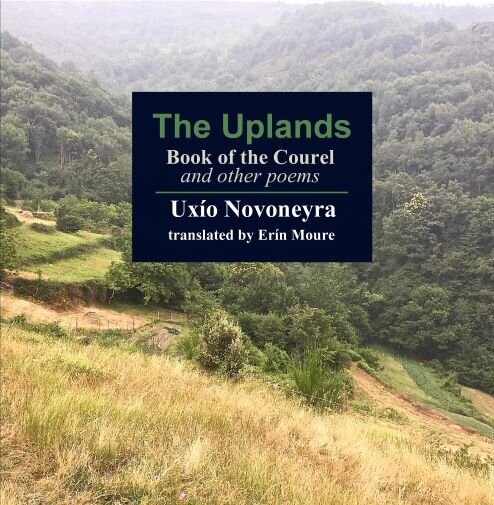
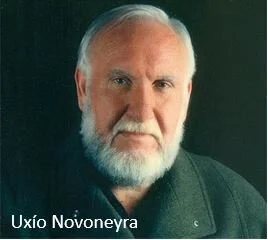
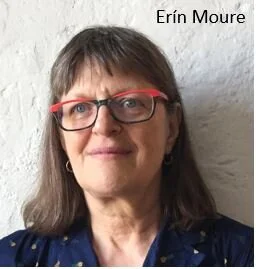
Photo credit: Karis Shearer
(aviary)
The poems in (aviary) circle themes of enclosure, feminism, and the natural world. Much of the collection was initially composed in local public gardens, lending these poems an air of urgency, the stink of voyeurism, and the hum of participation. This collection owes much, too, to Mina Loy's prose poem "Ladies in an Aviary," which lends language and thematic play to Kaplan's (aviary).
PRAISE FOR (aviary)
In (aviary) Genevieve Kaplan both relishes and challenges her limitations within these dynamic garden spaces and grants herself permission to re-design their elements of birds, leaves, beak taps, sugar, and shade. Borrowing scraps and hearsay from Mina Loy’s “Ladies in an Aviary,” Kaplan ponders her own complicit inclinations. The poems’ syntactical phrases veer, skip, and hover, defying time and vantage points: “the only fine thing, the only petaled thing, the gray / path slowly curving to the right, to the left, curving away the only only / soft thing.” At once furtive and bold, Kaplan considers the very “nature” of herself and these spaces and “how / to get outside enough to see myself looking in.” An intricate and gorgeous book by one of our most inventive poets.
—Molly Bendall, author of Watchful
ABOUT THE AUTHOR
Genevieve Kaplan is the author of (aviary) (Veliz Books, 2020), In the ice house (Red Hen Press, 2011), winner of the A Room of Her Own Foundation's poetry publication prize, and three chapbooks: In an aviary (Grey Book Press, 2016), travelogue (Dancing Girl, 2016), and settings for these scenes (Convulsive Editions, 2013). Genevieve earned her MFA in Poetry from the Iowa Writers' Workshop and her PhD in Literature & Creative Writing from the University of Southern California. She lives in southern California and edits the Toad Press International chapbook series, publishing contemporary translations of poetry and prose.
Website: https://genevievekaplan.com/


Into Muteness
Spanish poet Sergio Espinosa's first collection of poems, Hacia la mudez, translated by Kelsi Vanada as Into Muteness, begins with a quote from Celan: “the wilding conviction / that this is to be said differently than / so.” This sentiment underlines the impossibility of speech as conveyed in these poems, which explore the intricacies of mind/body dualism in human relationships, through lines that turn on repetition and doubling, theme and variation. Linguistically complex and formally exploratory, the poems in this bilingual edition remind us to “distrust what has many names,” even as we “need ourselves in others.”
PRAISE FOR INTO MUTENESS
How does one pen a poignant silence? In Into Muteness, Spanish poet Sergio Espinosa employs thick drops of words, repeated, recontextualized, often seen through a fog, seeking focus and firing off images: “your tear crashed against the window like a gunshot of honey.” Aphoristic phrasing, mirror-poems, and an ambiguous yet engaging unspooling of phrases challenge and delight. Bringing this verse into English for the first time, Kelsi Vanada wonderfully renders the musical and agonizing mist of these audacious poems of love and illness and the limbo of muteness.
—Lisa Rose Bradford, translator of Juan Gelman’s Today
ABOUT THE AUTHOR
Sergio Espinosa was born in Jerez de la Frontera, Spain, in 1988. His poems have been published in international anthologies and journals, and have been translated into twelve languages. Hacia la mudez is his first poetry collection (published in Spain by kriller71 ediciones in 2017) and forthcoming in France with Az’art Atelier Éditions. He also works as a translator, having translated Noah Cicero into Spanish for the anthology Vomit, which features young North American poets (published in Spain by El Gaviero in 2013).
Website: www.sergio-espinosa.com
ABOUT THE TRANSLATOR
Kelsi Vanada is a poet and a translator from Spanish and Swedish, with MFAs in Poetry and Literary Translation. Her translations include Into Muteness by Sergio Espinosa (Veliz Books, 2020), The Eligible Age by Berta García Faet (Song Bridge Press, 2018), and her chapbook Rare Earth is forthcoming from Finishing Line Press. Kelsi was an ALTA Travel Fellow in 2016, and the recipient of the American-Scandinavian Foundation’s 2018 Nadia Christensen Translation prize. She is the Program Manager of the American Literary Translators Association (ALTA) and lives in Tucson, Arizona.
Cover Art by Roman Antopolsky, “khlebnikov at the radio station”

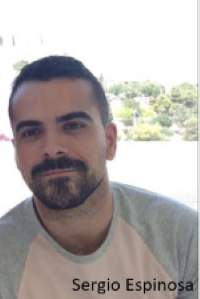

April Warnings
April Warnings is a collection of short stories that can be read together as one. The narratives are bound by the strange Midwestern ritual of going into an underground tornado shelter and a growing mythology about a particular plot of land on the railroad tracks of the Callahan Ranch in Baxter County. Farms, highways, and churches become the epicenter for truths, fictions, and myths rooted in larger ideas from the so-called "American Heartland," a place belonging to indigenous populations, immigration routes, and beliefs about worlds that exist beyond the prairie.
PRAISE FOR APRIL WARNINGS
Mark Pleiss' April Warnings is a revelation of rural life. The spirit of the Midwest and its people inhabit these connected stories like minerals in soil: subtle and vital. Tornadoes and livestock, farmers and worry, faith and cost: these are the building blocks of this part of the world. It's a place that too many people call 'flyover country,' but that Pleiss' fiction invites us into, to put up our feet and stay a while. You'll want to do just that.
—Teague von Bohlen, Fiction Editor, Copper Nickel and author of The Pull of the Earth and Flatland
The interconnecting stories in Mark Pleiss’ April Warnings reflect the best qualities of the oral tradition and, in particular, of fantastic tales and parables. Gentle, revealing humor emerges naturally in the surprising plot elements uncannily related to the warping of time that occurs after, during, and just before tornadoes. Engaging wisdom about the slippery nature of ‘truth’ marks every page, and, in fact, the characters’ fates are often decided by fictions that ring ‘true,’ magically true.
—Kevin McIlvoy, At the Gate of All Wonder, 57 Octaves Below Middle C, The Complete History of New Mexico, and other works of fiction.
ABOUT THE AUTHOR
Mark Pleiss is a writer in Denver. He publishes fiction, book reviews, scholarly criticism, and essays, and his work has appeared in Tupelo Quarterly, Colorado Review, The Omaha Pulp, Sequel, Fine Lines, Palimpsest, The Chronicle of Higher Education, The Denver Post, and elsewhere. He worked as a freelance journalist for The Omaha World-Herald and The Des Moines Register before completing a doctorate in Spanish Literature and teaching at St. Olaf College, CU Boulder, and Metro State University Denver. He is from Omaha, Nebraska.
Mark Pleiss’ website: markpleiss.com
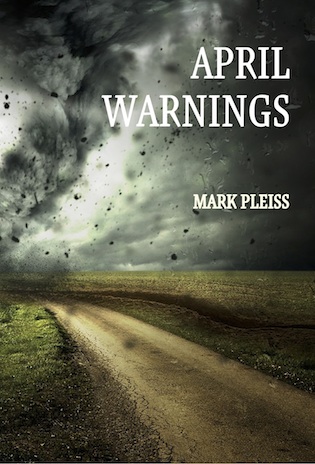

How to Know the Flowers
How to Know the Flowers by Jessica Smith is a poetry collection about processes: The process of naturally dyeing flowers, the process of dealing with trauma, the process of remembering. In her poems, Smith examines sexual harassment, female friendship, and grief, accepting the gaps and fragments that unavoidably occur while doing such work.
PRAISE FOR HOW TO KNOW THE FLOWERS
And here is the landscape of trauma petaled with knowing and unknowing, the delicate architecture between what rises to the surface and what keeps beneath the soil. The poems’ handling of sexual abuse is the taproot from which springs an invulnerability as they navigate from: “heal this loss please” to “I didn’t want to know / my failure.” Smith accurately draws the line between the threat to safety across borders of home, work, and country; and how these are not only interconnected but also quietly eroding at a rapid pace. Smith’s poems scatter across the page leaning into the dream work tapestry of: “I teach myself new things / to get to a new self” and this is how grief shapes us. How to Know the Flowers is the language of survive.
—Megan Burns, author of Basic Programming
ABOUT THE AUTHOR
Jessica Smith, Founding Editor of Foursquare and name magazines and Coven Press, teaches at the University of Alabama at Birmingham and curates the Treehouse Reading Series at Vestavia Hills Library in the Forest. She received her B.A. in English and Comparative Literature: Language Theory, M.A. in Comparative Literature, and M.L.S. from SUNY Buffalo, where she participated in the Poetics Program; she is now pursuing her M.F.A. in Creative Writing at Miami University (OH). She is the author of numerous chapbooks including Trauma Mouth (Dusie 2015) and The Lover is Absent (above/ground press, 2017), and two full-length books of poetry, Organic Furniture Cellar (Outside Voices 2006) and Life-List (Chax Press 2015).
Jessica Smith’s website: jessicassmith.myportfolio.com
Cover image by Jessica Smith


Body of Work
Tina Cane’s new collection of poems, Body of Work, fuses the personal and the political as it explores the nature of work, poetry, economics, and motherhood. Body of Work is a meditation on memory and change: the changing landscape of the inner and outer life, of family and city, and the nature of personal and cultural identity. Cane reflects upon the “continual mysteries” of her Chinese-American heritage and the complexities of being a person in the world with others.
PRAISE FOR BODY OF WORK
In this innovative and searing new collection, Tina Cane writes of memories amassed “like money banked beneath a mattress.” The result is a landscape of lyrical fragments and potent images that combine and recombine as the book progresses, with the poems weaving expertly through domesticity, motherhood, Chinese-American identity, and the city present and past. With stealth and insight, Body of Work takes us to places unforeseen, urgent, and essential.
—Natalie Schapero, author of Hard Child
ABOUT THE POET
Tina Cane is the author of the poetry collections Body of Work (Veliz Books, 2019) and Once More with Feeling (Veliz Books, 2017), as well as the chapbooks Dear Elena: Letters for Elena Ferrante (Skillman Avenue Press, 2016) and The Fifth Thought (Other Painters Press, 2008). Cane was born in Hell’s Kitchen, NYC. She attended the University of Vermont, the Sorbonne and completed her master’s degree in French Literature at the University of Paris IX-Nanterre. She is the founder and director of Writers-in-the-Schools, RI. Over the past twenty years, Cane has taught French, English, and creative writing in public and private schools throughout New York City and Rhode Island. Cane’s poems and translations have appeared in numerous journals including Spinning Jenny, Tupelo Quarterly, Cargo, Two Serious Ladies, The Birmingham Review and The Good Men Project. Cane was the 2016 recipient for the Fellowship Merit Award in Poetry from the Rhode Island State Council on the Arts. She is the Poet Laureate of Rhode Island.
Tina Cane's website: tinacane.ink
Cover image by
Alberto Giacometti, “Tête de cheval,” 1951
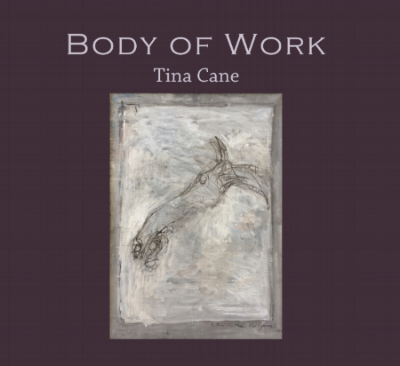
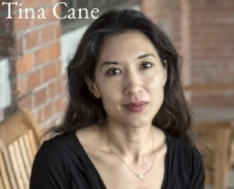
Black Wings
Spanning two continents, Black Wings is the story of Laila and Yasmeen, a mother and daughter, struggling to meet across the generations, cultures, and secrets that separate them. Their shared grief, as well as the common bond of unhappiness in their marriages, allows them to reconnect after seventeen years of frustration, anger and misunderstandings.
PRAISE FOR BLACK WINGS
Black Wings peels back layers of home and belonging, exploring what it means to be family from different worlds bound by shared secrets. Sehba Sarwar reveals the importance of stories, masterfully weaving the past with the present and Houston with Pakistan, in a narrative filled with love which offers us a glimpse into our shared—humanity.—Sorayya Khan, author of City of Spies
ABOUT THE AUTHOR
Sehba Sarwar creates essays, stories, poems, and art that tackle displacement, migration, and women’s issues. Her writings have appeared in publications including New York Times Sunday Magazine, Asia: Magazine of Asian Literature, Callaloo and elsewhere. Her novel, Black Wings, was first published in 2004 by Alhamra Publishing (Pakistan). Born and raised in Karachi, Pakistan in a home filled with artists and activists, Sarwar is currently based in Southern California where she lives with her husband and daughter.
To learn more about Sehba Sarwar and her work, please visit her website sehbasarwar.com
Cover drawings by Minal Saldivar
Collage design by Oskar Sonnen


Ready, Set, Go
Ready, Set, Go is Ana Patete's translation of Prontos, listos, ya (2010, Puntocero), a novella written by the Uruguayan author and screenwriter Inés Bortagaray. It chronicles the inner meditations and sporadic external interactions of a young girl in the backseat of a car on her way to a beach town with her family. The story is told in first person and oscillates between the girl’s precocious observations about life, death, family, Catholicism and love whilst balancing her tender and, at times, hilarious naiveté.
PRAISE FOR READY, SET, GO
An original and dazzling road novel that invites us, alongside its protagonist, to traverse the imagination's landscape, the language of dreams, and the rituals of childhood. Everything in it, beginning with the journey itself, is an entrance to another astonishing trajectory, the constant flow of verbal intuition: that which opens itself up naturally to the children’s gaze, and that, with the passing of time (that other journey), some of us achieve preserving in our adult intimacy. In her aesthetic discoveries, Inés Bortagaray has best conserved the narrative tradition of Felisberto Hernández and Mario Levrero, rigorous in its inquisitiveness, its ludic strength, and its rich and inimitable strangeness.
– Carlos Yushimito, author of Lecciones para un niño que llega tarde (Lessons for a Child Who Arrives Late)
ABOUT THE AUTHOR
Inés Bortagaray (1975, Salto, Uruguay) is a writer and screenwriter. She published Ahora tendré que matarte (a Flexes Terpines collection, directed by Mario Levrero), and Prontos, listos, ya (Ready, Set, Go) (translated into Portuguese by Cosac Naify). Some of her stories and non-fiction work has appeared in Bogotá Contada (Libro al Viento, Colombia); Pequeñas resistencias 3, una antología del nuevo cuento sudamericano (Páginas de Espuma); Número Cero, el perro, and Zoetrope: All Story, among other journals and anthologies. Other stories by Bortagaray have also appeared in projects such as Suelta, Los Noveles, Nuestra aparente rendición, Palabras errantes: Latin American Literature in Translation, Altaïr, and El futuro no es nuestro.
Bortagaray has worked as a film screenwriter for directors from Uruguay, Argentina, and Brazil. She obtained the Special Jury Prize at the 2016 Sundance Festival for her screenplay of Ana Katz’s Mi amiga del parque (My Friend from the Park).
ABOUT THE TRANSLATOR
Ana Patete was born and raised in New York City, having moved to Puerto Rico in her adolescence. She attended Brown University, where she received a BA in Hispanic Studies. She has spent time in Argentina and Uruguay, where she unearthed her zeal for literary translation and medialunas.
Cover image by Gerardo Cedeño Garza
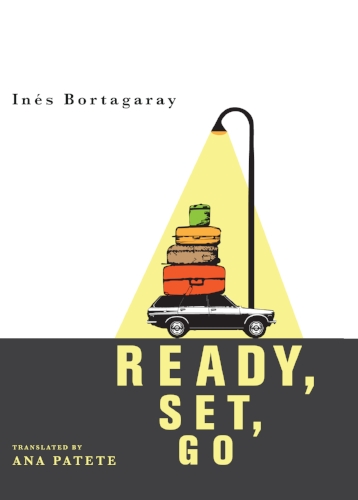
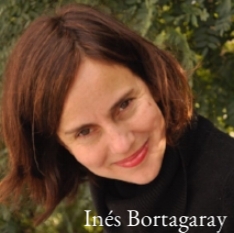
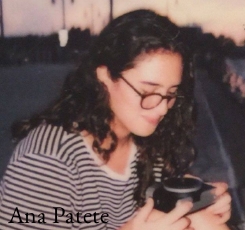
History of Gone
History of Gone is a collection of poems inspired by the life and unsolved disappearance of Barbara Newhall Follett, a once-famous child prodigy writer of the early 20th century.
PRAISE FOR HISTORY OF GONE
"A daring conceptual feat of reanimated biography, History of Gone arrives in its forms of oblique memorial drenched in lyric imagination: “Everywhere you look there’s a finger bone of some gone woman.” Schmeidler’s rich lexicons frame intimate interior geographies—swoop and silhouette, beatitude and gingerbread, planets and wolfhounds—all the while replaying the “stolen reel” of a forgotten life. As the lavish particulars unfold—a mouthbrooder, an anhinga, a purse dehisced—these poems invite charged questions about autonomy, creativity, and self-effacement: “What kind of play is she in, ‘finished by a death’ or ‘ended by a marriage’?” A cautionary tale of the erasures of domesticity, a vocational fable, an inside-out bildungsroman, this book envisions the prismatic possibilities when the self makes a “clean sneak,” and the result is nothing short of levitation."
—BK Fischer, author of Radioapocrypha
ABOUT THE POET
Lynn Schmeidler is a poet and fiction writer. Her first chapbook, Curiouser & Curiouser, won the 2013 Grayson Books Chapbook Contest. Her second chapbook, Wrack Lines (Grayson Books), was a finalist for both The Jessie Bryce Niles Chapbook Contest and the Two Sylvias Press Chapbook Prize. Her work has appeared in journals such as The Awl, Barrow Street, Boston Review, Fence, The Georgia Review and The Southern Review, as well as in anthologies such as Transition: Poems in the Aftermath (Indolent Books); Mischief, Caprice and Other Poetic Strategies(Red Hen Press); Bared (Les Femmes Folles Books); and Nasty Women’s Poetry Anthology: An Unapologetic Anthology of Subversive Verse (Lost Horse Press). She is a Pushcart Prize nominee in fiction. Educated at Yale University, Lynn lives in Westchester County, NY where she writes and teaches. History of Gone is her first book.
Lynn Schmeidler's website: Lynnschmeidler.com
Cover image by Kate Schmeidler
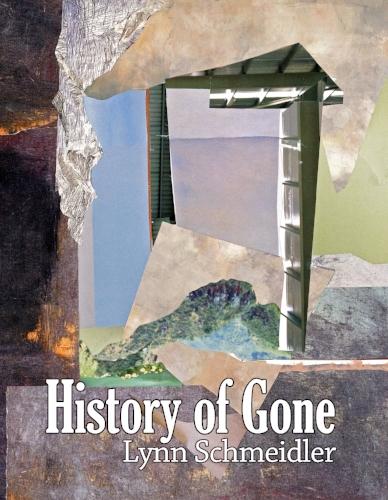

The Ghetto
The Ghetto, Seth Michelson’s translation of Tamara Kamenszain’s El ghetto is a poetry collection that reveals a speaker living in a liminal space, typical of exiles and migrants, where various languages, cultures, and identities are in constant dialog.
PRAISE FOR THE GHETTO
The poems in Tamara Kamenszain's book The Ghetto breathe and live boldly and beautifully in Seth Michelson's spot-on translations. Written in Spanish, with the ghosts of Hebrew and Yiddish never far in the background, these poems cast a discerning eye toward the meaning of words such as "ghetto," "exile," and "ancestors" in a world of borders, edges, and death. Yet, as in the poetry of Paul Celan, one of the guiding spirits of this book, what is beautiful is never fully abandoned. "Today in the crowns of the trees all my roots flower," she writes in the poem "Tree of Life," offering vision and salvation from within the landscape of a Jewish cemetery in Buenos Aires. Thanks to Seth Michelson, this book is now a marvelous and significant contribution to English language as well as Argentinean verse.
--Gail Wronsky, translator of Flowering Fires/Fuegos Florales by Alicia Partnoy
ABOUT THE AUTHOR
Tamara Kamenszain is the author of ten full-length books of original poetry, beginning with De este lado del Mediterráneo (l973) and including most recently El libro de los divanes (2014). She has also published four scholarly books about poetry. To date, her poetry has been translated into Portuguese, Italian, German, and English, and it can be found in anthologies around the world. Her many prizes include a Guggenheim Fellowship in poetry, a Pablo Neruda Medal of Honor from the President of Chile, two Konex prizes for poetry, a Premio Honorífico José Lezama Lima from the Casa de las Américas in Cuba, and Book of the Year from the Buenos Aires Book Fair for her complete works of poetry (to date): La novela de la poesía.
ABOUT THE TRANSLATOR
Seth Michelson is an award-winning poet, translator, and professor. He has published thirteen books of poetry and poetry in translation. His books of original poetry include Swimming Through Fire (2017) and Eyes Like Broken Windows (2012). Recent translations include The Red Song (2017; Melisa Machado, Uruguay) and Poems from the Disaster (2016; Zulema Moret, Argentina). He also edited and translated the anthology Dreaming America: Voices of Undocumented Youth in Maximum-Security Detention (2017), after leading poetry workshops for two years in the most restrictive maximum-security detention center in the U.S. for undocumented, unaccompanied youth. He teaches the poetry of the Americas at Washington and Lee University.
Cover image by Tano
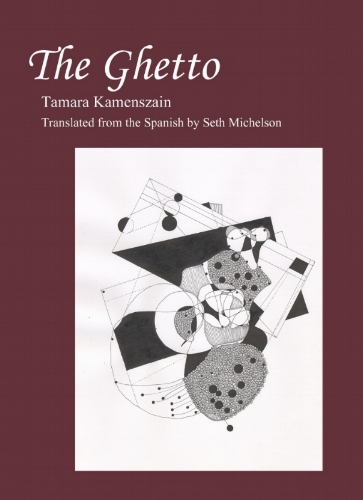


Once More with Feeling
Once More with Feeling is a collection of poems that takes us through urban and personal landscapes. It shows us particular landmarks of New York, as well as a particular New York, one lived through the experience of a speaker that boldly expresses anecdotes of all hues. This is a book about her relationship with a place that has been appropriated into a personal space. The reader is privy to the negotiations that take place in the construction of relationships. Once More with Feeling is an honest and gritty book that invites us to experience the connection between the self, the spaces we inhabit, and the people who share these spaces with us.
PRAISE FOR ONCE MORE WITH FEELING
“To look; to see; to listen as a mind both oscillates and 'readies its key,' using the poem as both portal and tool; to balance a spacious consciousness with the thrum and verve of urban landscape: these are the gifts of Tina Cane's poems. Simultaneously patient in their thinking and dynamically inclusive, these poems of place—the Lower East Side, Hell's Kitchen—with grit and grace navigate through and beyond neighborhood and family, eager for both presence and evolution. Her work, 'every bit of it something/wanting to happen,' both smokes and breathes, 'wanting to do both all the same'—it brings vice, complaint, celebration, and elegy to bear in poems where minor keys blossom into major vision. This is a worthy and moving debut.”
—Michael Morse, author of Void and Compensation
ABOUT THE POET
Tina Cane was born in Hell’s Kitchen, NYC. She attended the University of Vermont, the Sorbonne and completed her master’s degree in French Literature at the University of Paris IX-Nanterre. She is the founder and director of Writers-in-the-Schools, RI. Over the past twenty years, Cane has taught French, English, and creative writing in public and private schools throughout New York City and Rhode Island. Cane’s poems and translations have appeared in numerous journals including Spinning Jenny, Tupelo Quarterly, Cargo, Two Serious Ladies, The Birmingham Review and The Good Men Project. She is the author of The Fifth Thought (Other Painters Press, 2008). Cane was the 2016 recipient for the Fellowship Merit Award in Poetry from the Rhode Island State Council on the Arts.
Tina Cane's website: tinacane.ink
Cover image by Pedro Pérez del Solar
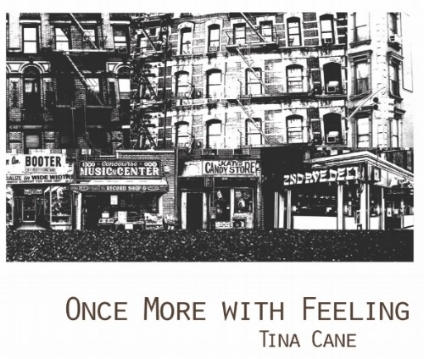
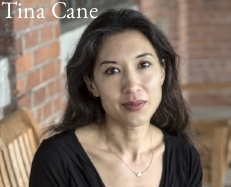
The Grill
Translated from the Spanish by Scott Spanbauer, La parrilla by Adolfo Pardo is the account of a young woman detained and tortured during the Pinochet dictatorship. It was originally published in 1981 with the intention of bringing awareness to what was happening in Chile at the time. Now for the first time in English, The Grill, is an important historical document that relates the atrocities of this dictatorship. According to the editor, critic, and essayist Vicente Undurraga, “the story’s merit, what gives it interest that goes beyond its documentary value, is its non-accusatory, but instead descriptive nature, and its less ideological and Manichean than human (too human) plot.”
PRAISE FOR THE GRILL
"La parrilla [The Grill], Adolfo Pardo’s transcription and novelization of a 19-year-old woman’s account of her detention and torture under the Pinochet dictatorship, now translated by Scott Spanbauer, is a historical literary document that we are fortunate to have. La parrilla was published and circulated clandestinely in Chile in 1981, and Pardo put himself at great risk to make sure that his story was told: a story of horrific detail; a story of unspeakable pain, shame, and torture that reveals, among other things, how Chilean doctors facilitated the physical, sexual, and psychological abuse of prisoners. This is a story about how a person lives through and survives the vilest of man-made hells, yet the speaker somehow maintains a spiritedness and determination that is itself and act of political force and resistance. This book, which first appeared amid the dangerous silence of repression and censorship, is not just a document of history; it’s also a document about how history gets written when those who demand justice and recognition are brave enough to sacrifice their lives so that the most vulnerable of voices will never disappear, will remain present to expose what brutal state governments are capable of doing to their own people."
—Daniel Borzutzky, translator of Country of Plants by Raúl Zurita
ABOUT THE AUTHOR
Adolfo Pardo Armanet is a Chilean writer, editor, and cultural promoter. He is the author of several collections of short stories, including Después del toque (Talleres del Mar, 1979), Inéditos (Talleres del Mar, 1997), and Una biografía distinta (Talleres del Mar, 2009). He is also the author of two novels: Los insobornables (Talleres del Mar, 1997) and La silla de ruedas (Ril Editores, 2007). He wrote and published the testimonial account La parrilla (Talleres del Mar, 1981), whose second edition came out in 2012 with Ocho Libros. During the 80s Pardo published the journals Cuadernos marginales in Chile and Emergencia in France. He is currently the editor of the online magazine Crítica.cl, which he founded in 1997.
ABOUT THE TRANSLATOR
Translator Scott Spanbauer worked for many years as a technology writer and editor, and taught Spanish at the University of Colorado, Boulder. His translation of Uruguayan poet Laura Cesarco Eglin's collection Calling Water by Its Name was published by Mouthfeel Press in 2016. He lived in Santiago, Chile from 1980 to 1981.
Visit Scott Spanbauer's website at Spanbauer.com
Cover image by Daniel Ríos-Lopera
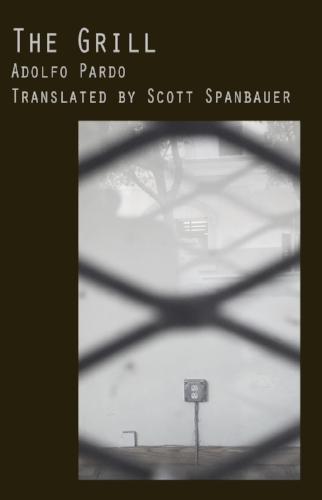

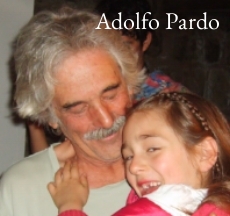
One of These Days
One of These Days by Trent D. Hudley is a collection of short stories that range from the fantastic to the mundane. The book as a whole asks the existential question of how does one create meaning in an ungraspable universe. As the characters struggle to conceptualize their lives, they grapple with violence, environmental issues, and inequality as pertains to race, gender, and socio-economic status. Each character faces different challenges and situations that defy their attempts at apprehending them. Some of the characters, because of their chauvinistic language and view of the world, are condemned to perpetually inhabit the same limited spaces they seek to escape. Others are in search of connections with those around them and with their ability to articulate their desires and identities. However, as Nancy Stohlman points out, “These are not stories without hope; One of These Days is a book striving for redemption.”
PRAISE FOR ONE OF THESE DAYS
"Trent D. Hudley is a brave, new writer with great compassion and haunting vision. Reading the stories in One of these Days, we enter the dreamlike gates of purgatory and are witness to great eruptions of sadness, rage, and joy. Hudley's nuanced portraits explore the depths of human psyche and shed light on our limitless capacity for grief and hope."
—Tyrone Jaeger, author of So Many True Believers and The Runaway Note
ABOUT THE AUTHOR
Trent D. Hudley is a professor of English. He teaches in the Creative Writing MA Program at Regis University; he also teaches at Metropolitan State University, and the Community College of Denver. He earned his BA from Metropolitan State University and his MFA from the University of Texas at El Paso. He was raised in Denver, Colorado, and before he entered the world of academia he held a multitude of positions including working in the Denver Post Sports Room, janitor, kitchen manager, painter, cashier, and a multitude of other similar jobs. He lives in Denver in the company of his friends, family, and his daughter.
Cover image by Daniel Barbeito
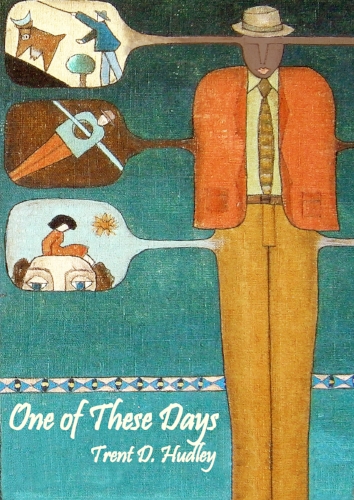

La isla de tu nombre
SOBRE LA ISLA DE TU NOMBRE
"Peregrina en su propio corazón, la voz poética de La isla de tu nombre, nos señala su kilómetro cero, su objeto de deseo; el punto en el que todos los caminos y todas las distancias son abordados y en el cual todos los caminos y todas las distancias desembocan. En esa poderosa reciprocidad sucede una interiorización del tiempo que realmente logra nombrarnos, y en el que lo cotidiano y los objetos, a su vez, nos potencian para nombrar al mundo desde un corazón multiplicado que hace sus conversaciones, pero que también expone sus trazos vulnerables. Un corazón multiplicado es transparente, pero también terrible, como lo es su repentina no brújula, como lo es replegar cada gesto aprendido sobre aquella geografía, y recomenzar desde actos tan simples como cortar una tarta de frutas o ver 'el apasionamiento / del esmalte de uñas que se cae poco a poco', actos que nos hacen reconocer que los objetos y el mundo que convergía en cada uno de ellos, no sólo nos han retirado el habla sino que nos han despojado de todo un lenguaje edificado desde los huesos."
—Claudia Berrueto, autora de Polvo doméstico y Sesgo
SOBRE LA POETA
Gabriela Aguirre (Querétaro, México). En 2003 obtuvo el Premio Nacional de Poesía Joven Elías Nandino con el libro La frontera: un cuerpo, y en 2007 el Premio Nacional de Poesía Enriqueta Ochoa con el libro El lugar equivocado de las cosas. Ha sido becaria del FONCA, del Consejo Estatal para la Cultura y las Artes de Querétaro (en la categoría Jóvenes Creadores), y del Instituto Queretano de la Cultura y las Artes (en la categoría Creadores con Trayectoria). Fue becaria de la Fundación para las Letras Mexicanas en el área de Poesía de 2005 a 2007. Ha sido incluida en diversas antologías de poesía y textos suyos han sido publicados en varias revistas y periódicos nacionales y estatales. Algunos de sus poemas han sido llevados a escena en la obra de teatro “Homenaje a un ciego que abrió los ojos”, bajo la dirección de Rodrigo Canchola. Estudió la Licenciatura en Lenguas Modernas-Español en la Universidad Autónoma de Querétaro y la Maestría en Creación Literaria en Español en la Universidad de Texas en El Paso. Actualmente estudia un Doctorado en Artes en la Universidad de Guanajuato.
Cover art by Elva Paulina Kababie
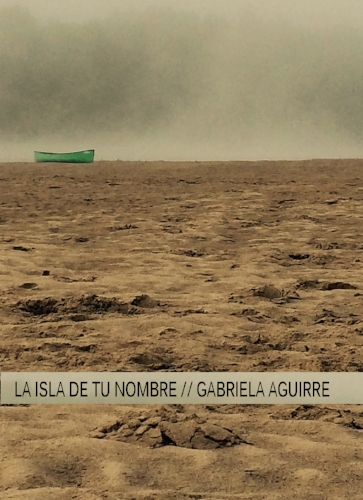

Travelers Aid Society
Travelers Aid Society by Jeff Sirkin is a collection of poems intimately related to music, cities, and the insightful perceptions of a peripatetic speaker. The reader is led through different historical, socio-cultural, and political happenings and contexts by a keen observer. Sirkin reveals treasures in what we might otherwise take for granted and deem as mundane: a conversation at a bar, a plumber at work, cold winters in Buffalo, mornings with family reading the Cincinnati Enquirer, dealing with bureaucracy when crossing the Juárez-El Paso border, the Ohio River in the late nineteenth century, going through LPs, and more. Music appears interwoven throughout the book as a kind of soundtrack, including songs by Billie Holiday, Miles Davis, Bob Dylan, Bing Crosby, among others.
PRAISE FOR TRAVELERS AID SOCIETY
"Jeff Sirkin’s Travelers Aid Society charts a wayward swerve off the grid of received United States history lessons, a wanderer defying artificial borders. Whether Cincinnati, Buffalo, or Ciudad Juárez, Sirkin turns a city’s artifice aside and confronts its infrastructure instead: machines and the people whose labor operates them. A plumber repairing a drain. A bartender serving last call. These tender-hard (think Gen X punk) poems also document the speaker’s own consumer culture, his service economy. Thrilled to travel (post) cities with this keen-eyed poet."
Carmen Giménez Smith, author of Milk and Filth and Odalisque in Pieces
ABOUT THE POET
Jeff Sirkin grew up in Cincinnati, Ohio. He writes on popular music and literature, and his work has appeared or is forthcoming in Mandorla;Forklift, Ohio; Puerto Del Sol; The Volta; and elsewhere. He currently teaches in the Creative Writing Department at the University of Texas, El Paso, where he also co-curates the Dishonest Mailman Reading Series.
Read Jeff Sirkin's blog at: travelersaidsociety.wordpress.com
Cover image by Jennifer Hill
Author photo: Marc Sirkin and Steve Hymon


Touching the Light of Day: Six Uruguayan Poets
Save for the occasional soccer-related news, Uruguay is seldom featured in the media and little more than a name in the minds of most readers. The same happens with the greater part of its writers, very few of whom have been translated into foreign languages. This substantial anthology, drawing from the work of some of the country’s most beloved poets, attempts to remedy that omission, presenting a vibrant and luminous selection that takes the reader from lush poems inspired by the classical antiquity to austere and introspective urban pieces deeply rooted in the local culture—with much more in between. Ably and sensitively translated by Laura Chalar, a contemporary Uruguayan writer, and accompanied by insightful introductions by the Uruguayan scholar Gerardo Ferreira, the works in Touching the Light of Day: Six Uruguayan Poets offer an exciting opportunity to visit, via its literature, a country too often overlooked by travelers and readers alike.
PRAISE FOR TOUCHING THE LIGHT OF DAY: SIX URUGUAYAN POETS
"Uruguay, the smallest Spanish-speaking country in South America, has always been blessed with an abundance of poets, but many of them have never or only rarely been translated into English. In Touching the Light of Day: Six Uruguayan Poets, Laura Chalar’s wonderfully lucid translations of Julio Herrera y Reissig, Alfredo Mario Ferreiro, Susana Soca, Líber Falco, Pedro Piccatto, and Humberto Megget help repair this great injustice."
Jesse Lee Kercheval, translator of The Invisible Bridge: Selected Poems of Circe Maia
ABOUT THE TRANSLATOR
Laura Chalar (Montevideo, Uruguay) is a poet, short story writer and translator. Laura, who is trained and practices as a lawyer, has published several books, including Unlearning (Coal City Press, 2018) and The Guardian Angel of Lawyers (Roundabout Press, 2018). She has also published numerous translations from and into Spanish, including works by Jane Austen and Jules Supervielle. Her latest children's book, El señor de las baldosas / The Paving Stone Man, translated into English by herself, is a bilingual fable taking place in the Old Town of Montevideo.
Cover image by Raquel Barboza
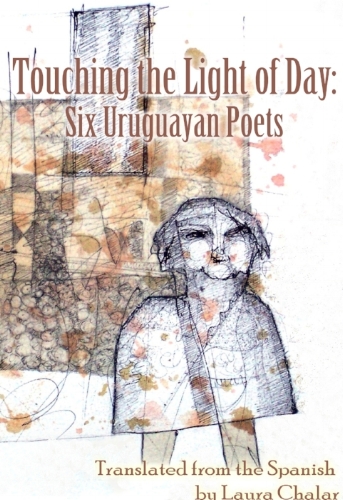
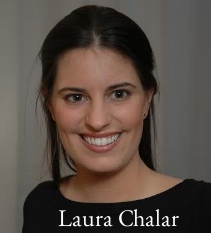
The Dead Will Rise and Save Us
The Dead Will Rise and Save Us by Paul Pedroza is a collection of short stories set in the border cities of El Paso/Juárez with an array of interesting characters, which range from high school students negotiating their identities, homeless characters living in the San Jacinto Plaza, characters that navigate the border between Ciudad Juárez and El Paso, and more. This collection embodies life in the border in many ways, such as the bilingualism of the characters, the socio-cultural elements of the settings, and the tensions between the difficulties and beauty of living in the border region.
PRAISE FOR THE DEAD WILL RISE AND SAVE US
"The Dead Will Rise and Save Us, much like El Paso and the desert Southwest, is hazarded with moral complexity and unforeseen grace. Paul Pedroza's stories, the characters crawling inside them, will not leave you soon after reading. They'll remain beneath your skin and in your bones."
Matt Mendez, author of Twitching Heart
ABOUT THE AUTHOR
Paul Pedroza was born and raised in El Paso, Texas. He received his M.F.A. in Fiction from the University of Illinois at Urbana-Champaign. His work has appeared in Rattle, MAKE: A Chicago Literary Magazine, Palabra, BorderSenses, Confluencia, Inquiring Mind Buddhist Magazine, and in various anthologies, including Our Lost Border (Arte Público Press, 2013) and New Border Voices (TAMU Press, 2014). Currently, he teaches at New Mexico State University and is completing his first novel.
Paul Pedroza's website: paulpedroza.com
Cover art by Federico Villalba
